




Te Kūiti will host the Heartland Championship’s Lochore Cup final on Sunday for the first time in nine years when King Country takes on West Coast.
King Country made the final after beating Ngāti Porou East Coast 34-29 on Owen Delany Park in Taupō last week.
The province’s most capped player Paul Mitchell said he was expecting a good turnout at Rugby Park for the 2.30pm match. Ground capacity is 3000 but Mitchell said he would be happy with 500.
The Rams coach Aarin Dunster – who played more than a century of games for the province - held the cup aloft in 2015 as captain, the last time the team played in a home final. They beat North Otago 47-34 that day.
King Country has been runner up twice – in 2006 when Poverty Bay beat them 46-34 and in 2016 when the Rams lost 44-22 to North Otago.
In the Heartland Championship, the teams ranked one to four at the end of the round robin play for the Meads Cup – named after King Country legend Colin Meads - while the teams ranked five to eight play for the Lochore Cup – named after WairarapaBush and All Blacks captain Brian Lochore.
Both were knighted for their services to rugby.
Lots of points scored in the semifinal was no pointer for the final, said Mitchell.
“That means nothing now, she’s a one-off game. It’s still at home – you like to feel that you are going to be the favourites anyway.
“One and two got kicked out. Thames Valley was three and Mid-Canterbury were four. A betting man would never have picked that, I can tell you right now.”
Mitchell thinks the King Country forwards will take it on and help get the ball out wide where a lot of the season’s tries have been scored.
“We have got a big back line counterattack but West Coast will still spin it pretty wide as well, but if they get into the close quarters they will go back to their strengths, which is their forward pack – especially round the try line.
“They’ve got one more game, there’s nothing after this and there’s a trophy to lift at the end. They can’t hold back.”
The weather was looking good for Sunday (partly cloudy, light winds and a high of 21) which he expected would favour King Country.








By Paul Charman
The Te Kūiti Volunteer Fire Brigade has honoured the service of its members.


Fire chief Hayden Sheedy said there had been about 130 calls so far this year, which had trended slightly down on the same time last year. Recent highlights included an open day at which a good number of people showed interest in volunteering, and the fact that Ryan Rendall and Kale New had attained station officer rank.
Having been awarded a 20-year-service medal, Rob Katipa Maikuku said he could look back on his time with much pleasure.
“Honestly, it’s been great; I enjoyed the camaraderie, the training and service to Te Kūiti and the wider community. I would recommend it to anyone thinking of doing some voluntary service. You learn so many

useful skills, make great friends and stack up (significant) memories. Sure, some of those you want to remember and some you don’t –but overall I wouldn’t swap my time with the brigade for anything.”
Avinesh Madulier received a presentation following nine years of service. “It was a bit sad to be moving on. Other commitments and hobbies make it hard for me to commit at this stage, but I’m probably not done yet. I’d really like to go back after some time, depending how it works out for me. They’re such a great bunch of people and they always made you feel like part of the family. I found it fun to work with these guys; we had good laughs, and they always looked after us.”
Alice Woolston said receiving her five-year service medal was, amazing and was funny how quickly the time had gone past. “I’m pleased to have made it to the five years;

I loved every minute of being part of the brigade.
Asked about late-night calls Woolston said: “They’re just part challenge and excitement”.
“Also, there’s the satisfying aspect that you’re able to help people when they need it. All of that keeps you going – and you don’t have time to think of any of this when the siren goes anyway.”
Josh Henderson said his five-year-medal seemed a positive achievement. Service in the brigade was a family tradition, as his grand father and great grand father had both served.
“The big appeal in our brigade here in Te Kūiti is the family environment and camaraderie.” The brigade had exceeded all his expectations in a positive way. “And I don’t envisage quitting any time soon”.
• Our stock and (fire) station agent - See page 13.
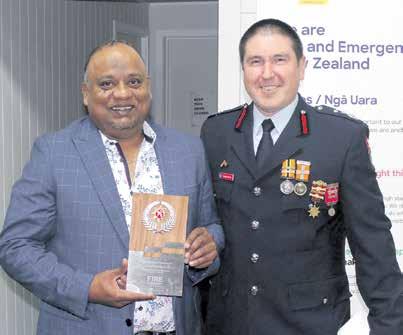







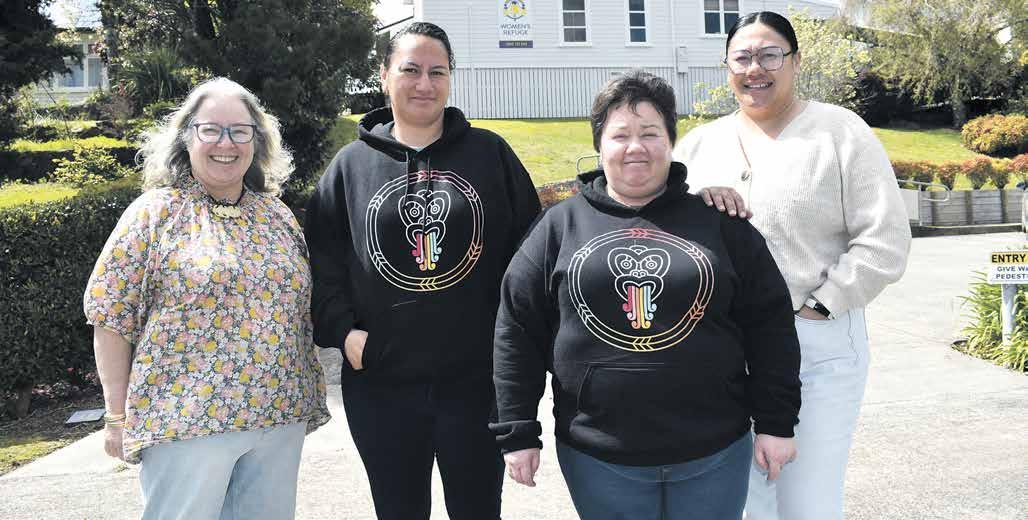
By Paul Charman
Keeping women and children safe - that’s what the Waipā Waitomo Women’s Refuge has been doing for 25 years and with the opening of a new community office, they’re set to continue doing so.
Manager Wendy Valler said the new Te Kūiti office – which opens officially on Monday - was an achievement far beyond the vision of the women who started the refuge at the end of last century with no funding.
“Slowly a committed team of volunteers created a service that has grown to what is it is today, and we are grateful for the women who walked this path before us and the supporters who assisted with funding and advice to allow us to find a permanent home for our refuge in Waitomo, ensuring suitable service delivery for the future,” Valler said.
The office, a former early childhood centre, is one of two administrative
sites employing 13 staff. The other one is in Te Awamutu.
The organisation also operates safe houses and a transitional housing facility in Te Kūiti.
“We offer community support to women, children and whānau experiencing family violence and we have safe houses when home isn’t safe for wāhine and tamariki.
“We are available 24/7 on our Crisis Line but work with families with their immediate needs around safety through to building resilience and becoming a safe thriving whānau.”
The new office has meeting rooms and will become a base for educational programmes and support for children.
The Violence Free Maniapoto coordinator also sits within the refuge and works to provide education around healthy and unhealthy relationships and where to go for help
Valler said while the steady stream of family harm incidents on a weekly
‘Family
doesn’t start overnight, and it doesn’t
basis in Te Kūiti and Ōtorohanga was sad, she liked that people were reaching out for help and that neighbours were calling police when necessary.
“This shows we are looking after vulnerable members of our community. The fact that family violence is being reported to the police is great. We would like to see more of that because we know there is a lot that goes unreported,” she said.
“We get referrals from other agencies, family and friends. People only reach out for help when they are at the end of their tether and at that moment can’t think of anything else to do.”
Family harm permeated into every area of your life, she added.
“When you get worn down and can’t think of any more strategies to try – that’s when we reach out for help. But here at Women’s Refuge we’d like to be ahead of that curve. We want to be there when people start to get worried, when it (abuse) is in its early days and perhaps just starting out. We want to be there early to put strategies in place to help keep whanau safe.”
Women’s Refuge had no statutory powers and did not force its services onto anyone, she said.
“We only work with people who want to engage with us – if they reach out, we have support and strategies that can help. Information is available on what healthy and unhealthy relationships look like –identifying things that might not be so great in your relationship and being able to put a name to them is helpful. Information is power.”
She saw providing safe spaces for children to grow up in as a shared responsibility.
“Everyone should keep an eye
on situations to ensure their family members are safe. Family violence is across the board - not an issue that belongs to a certain sector or demographic.”
Valler urged people to take the long view if anyone reached out to them over family violence.
“For example, if somebody tells you what they are going through, don’t judge them or cut off if they return to an abusive relationship. They are still going to need you in the future; family violence doesn’t start overnight, and it doesn’t end overnight.”
The job was tremendously rewarding, however.
“I am very lucky to be doing this work. We help people at their most vulnerable point and with the type of work we do we see really resilient women. They live lives where they go to work, get up each day, make lunches and maybe coach sports team on top of what they have going on at home. There is amazing strength and resilience in women.”

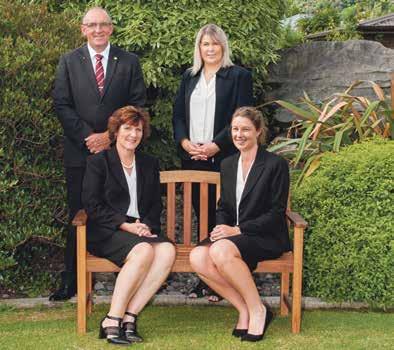




Sigrid Christiansen
Fifteen Thai students enjoyed their first day at Te Kūiti High School on Monday to start a two-week exchange visit.
While in Waitomo they will visit the Ōtorohanga Kiwi House, Waitomo Caves, Te Kūiti Pā and head further afield to Rotorua. It’s all thanks to the
programme restarting “for the first time since preCovid,” principal Gareth Williams said.
The group travelled via Malaysia with teacher Nirut Manrum, who teaches Thai history at a girls’ school catering for 4400 students in the city of Nakhon Ratchasima, just over 250km northeast of Bangkok.
At the pōwhiri, he gave a
well-received speech which started in Thai, continued in English, and finished in te reo Māori.
He said the group members were new to each other, as well as to New Zealand.
“The students are all from different parts of Thailand, and they had never met each other before the orientation camp, a few days just before we left,” he said.
“They’ve come for an exchange and to make friends.”
At the camp in Bangkok before flying out, the youngsters started planning for a “Thai Night” extravaganza on October 30, a celebration of Thai culture.
“It’s a thank you to Te Kūiti High School. It will feature traditional dances, songs and cooking, from

the students’ own specific regions.
They’ll leave the next day.
To participate in the exchange, students had to pass a series of tests and interviews.
Their families have paid for their travel.
Manrum said a few of the students had travelled overseas in the past, but not all.
Gareth Williams was thrilled Te Kūiti High School was hosting the students, and acknowledged their koha on his office bookshelf, a framed elephant decoration.
“The learnings will be great. I don’t think our students have a deep knowledge of Thailand yet, although they will have seen
different things on TV.
“Learning to understand and value other cultures is more important than ever,” he said.
He said he wasn’t the right man to thank – that was teacher aide Marcel Karepa.
“The work that has been done, has been done by him,” Williams said. “He’s been the driver, the pathfinder and the frontiersman, we’ve just supported him to do it.”
The exchange programme had stopped around 2018, and Williams said the school saw an opportunity to reengage with it.
“We hope to get to the point where we are sending students to Thailand. That’s in its early stages, there’s nothing planned yet.”
Police are appealing for information to find who helped themselves to the use of a parked boat at Kāwhia.
The boat, left on its trailer near the boat ramp in the town, was vandalised, items were stolen from it and appeared to have been the scene of drug use.
The owner contacted police to say that between October 1 and October 12, somebody had entered the boat, “lighting fires, doing drugs and popping pills”.
As well as eating food stored onboard they had taken away items, including the keys to start the engine and five fishing rods.
“They used the toilet and made a big mess. There is lots of tackle missing, pills everywhere and curtains have been ripped out,” the owner reported.
When women get together, and the subject turns to health, chances are one of the things they mention is how they hate going to the doctor for cervical screening.
Some are so embarrassed by the prospect they refuse their screening; many have never bothered to go at all.
But since September last year, Te Whatu Ora’s National Cervical Screening Programme has had human papillomavirus (HPV) self-testing available and it has been a game changer.
“When I do in-home visits and explain how easy the new test is to do, it overcomes barriers to screening particularly for any woman who has been reluctant in the past,” Pinnacle Support to Screening mobile
outreach nurse Tracey Bates says.
“We consistently see women who have refused screening but are then happy to do it themselves in the comfort of their own home.”
In the past year Pinnacle outreach mobile nurses have screened 776 hard to reach priority group women in the Waikato. They have all been referred to the service by their GPs at Pinnacle’s Cambridge and Tamahere medical centres.
The focus has been on Māori and Pacific communities and disengaged women.
“There is no doubt screening saves lives but for some women the previous standard speculum examination was embarrassing and painful, which prevented them from having it
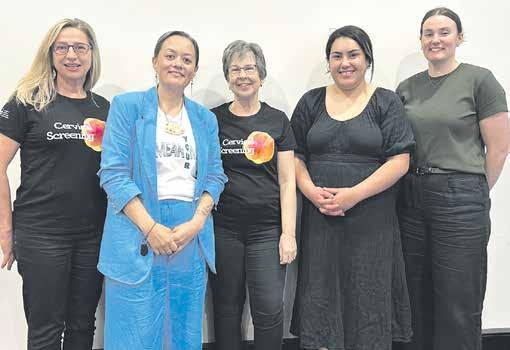







done,” says Bates.
“We have been able to successfully screen women who are 20-30 years overdue or never been screened before.”
The test, which takes about 20 seconds, checks for the human papilloma virus which causes more than 95 per cent of all cervical cancers.
The News has gone looking for information about the sundial next to the Les Munro centre in Te Kūiti.
We know it tells the time – well, in daylight hours – and despite never adjusting to New Zealand Daylight Saving, it can be more reliable than a mechanical offering – and it’s not two faced, telling one person one thing and another something else like our clock in Rora St does from time to time.
The sundial is also carefully looked after – check out the photo here with the garden beds prepared for a beautiful summer show.
So, we thought, let’s tell the story of the sundial. We went to the Waitomo District Council with some questions. And that’s where time stood still.
“Unfortunately we don’t have any information about the sundial - so cannot provide answers to any of your questions,” we were told.
So readers, if we are to get this story out of the shadows, we need your help - share what you know about the sundial to sigrid@ goodlocal.nz. Who designed it? Who opened it? How old is it?
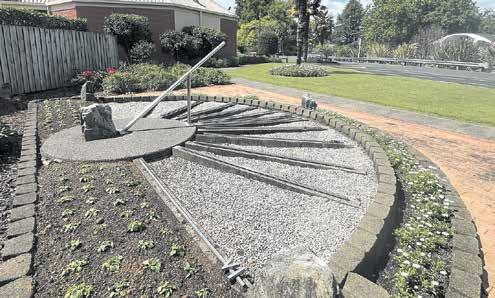













By Paul Charman
Mōkau Museum has celebrated Taranaki Heritage Month with a display by poi guru Rangipai Sheryl Martin.
Martin, who has been performing poi since age nine, gave a demonstration of performing with four-stringed poi and showed off the colourful modern poi designs she makes as artwork.
Raised in Taranaki, Martin (Maniapoto) recalled being fascinated with performing poi as a youngster then virtually abandoning the practice during most of her teenage years.
She spent 40 years in Australia but after visiting her Kiwi home during Covid, found she was unable to re-enter that country.
Needing a hobby to keep her mind active she returned to her love of poi, both performing with and making the ancient cultural objects.
“The practice of poi is an allround benefit to those us involved, not only fostering our culture but improving coordination, fitness and strength,” she said.
“I believe it helps with developing the right and left sides of the brain. And using the poi regularly has somehow reduced my asthma.”
Martin performs at an advanced level, holding four poi for three-
to-four minutes at a time.
This may not sound long but Martin had an interesting experience when asked by a karate club to put on a poi display.
Some of the members tried their hand at poi and most – including some black belts – could not hold them for even two minutes.
“Those guys tried their best but, I’m not quite sure what was going on really, they seemed to lack the right kind of arm strength required.”
Martin believes poi develops strength not only in the arms but also across chest, back and neck muscles.
Traditional poi are made from harakeke (New Zealand flax) and raupō, but Martin’s modern examples make use of wool and other materials. She constructs the poi and her sister, Moewai, dreams up their colourful designs.
“A lot of people do short poi; far fewer can do long, or double long. I was demonstrating for some girls involved in kapa haka yesterday. They were not holding them properly and their strings were too long. Relatively few seem to be able to perform well with four poi – it’s too much for their arms.”

Martin says there is a great need for continued training for those involved in poi as a performing art.
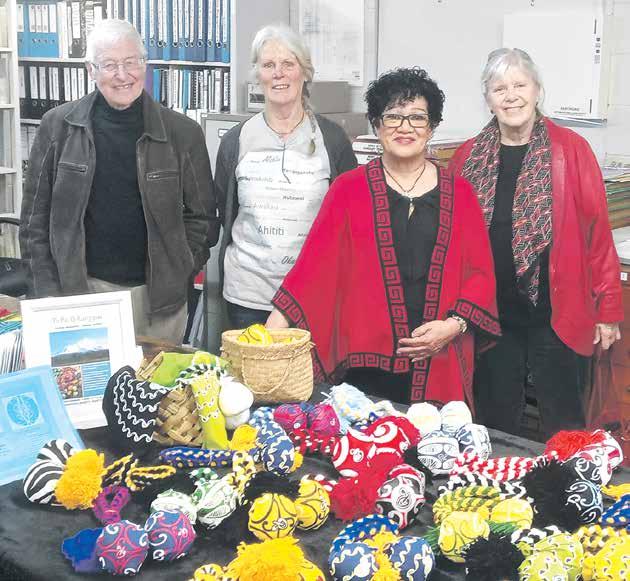







By Andy Campbell
King Country district councils who withdrew their funding from Hamilton and Waikato Tourism are waiting to see what any ongoing effects will be.
Waitomo and Ōtorohanga councils independently decided to cease their annual $72,338 grants to HWT during their annual and long-term plan processes earlier this year.
Waitomo offered a reduced amount if the district’s tourism operators would pay the balance.
“We did give them an option. For some reason HWT said no to that. We said we might put in $30,000 if an additional $30,000 was put in by industry, and HWT turned that proposal down,” Waitomo mayor John Robertson said.
“HWT has lots of data and will say a dollar invested through them will generate so many more dollars, but it’s not so straightforward, it’s not a linear relationship.
“Behind all this was also a view that business should pay for business investment and business promotion, so tourism operators the big guys especially, should be the ones contributing to HWT and not ratepayers, because they get a direct benefit.”
Tourists could go on a website if they were looking for ideas about where to go in the King Country. The biggest operator in the district was the Waitomo Caves and Tourism Holdings was the biggest player that already did its own marketing nationally and internationally, Robertson thought.
He was personally involved in a farm stay business and like other farmstay, bed and breakfasts, glamping and Air B&B accommodation, they did their own marketing.

He said a bit more than half were local customers and there was a bit of international custom. The farmstay was attractively located for fishermen, Robertson said.
“Fishermen like the rivers around our district, Awakino is popular for instance. I don’t know where you get your stuff from on rivers, there’s probably a fishing website.”
Similarly if people wanted to find out about the Timber Trail, there were websites.
Ōtorohanga’s funding cut also came out of its Long Term Plan discussions, mayor Max Baxter said. There was a question about whether the district was getting value for money.
“We decided to go with a cut back version. They originally said no,” Baxter said.
“Then they said, ‘Okay we can offer you something’. The proposal they then put forward we felt we could provide ourselves with a better in-house service, than what was being provided. And we knew that Waitomo were going through the same proposal .”
There had been a ‘high level’ discussion with Waitomo, but nothing that’s been workshopped.
“We haven’t sat down with Waitomo to see what we could do, so that would be a decision that would be made at governance level. There could be something between the two councils we could do something way better.”
The funding cut did not have to be a long term commitment.
“But it’s just ensuring that if we are spending money on grants that we are getting the best value for money. We will find out in the absence of them (HWT) whether we are missing the boat.”
Thursday 19 October • 9.30am start
Refreshments available • BBQ lunch provided Come along and enjoy a bowling experience and social time. Bring a friend, age no barrier. Ōtorohanga Bowling Club
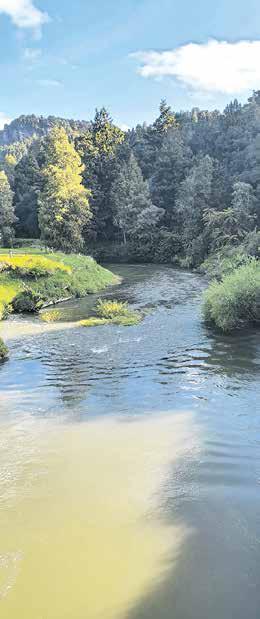
Councils in the Waikato which reduced their regional tourism funding for the current financial year may not have done so if the Jetstar announcement was made three months earlier, Hamilton and Waikato Tourism general manager Nicola Greenwell believes.
She believed those councils – Waitomo and Ōtorohanga which canned their fundingmay change their minds in future. Australian tourists will arrive direct at Hamilton Airport from Sydney and the Gold Coast from June 2025.
Waitomo and Ōtorohanga withdrew$72,338 each. Hamilton city continued its more than $700,000 funding, but overall HWT’s income will be down 18 per cent and it has resulted in two jobs being cut.
If Jetstar made its announcement three months prior, earlier in the year, it might have changed some minds and some thinking, Greenwell said.
For tourism operators in Waitomo and Ōtorohanga districts it meant they would have to rely on their own websites to draw visitors. There would be no service from HWT. Ōtorohanga Kiwihouse general manager Jo Russell said HWT had played a valuable role during a number of years in bringing tourists to the area, but she had not kept up with the play on the funding issue.
During the annual plans process HWT had returned to both councils with statements about what the councils’ offer of about $30,000 would buy in services from the regional tourism operator.
“They declined that,” Greenwell said. “You can’t go to the supermarket with half the money and expect to buy the same amount.”
Waitomo Society of Art Exhibition
Thank you to all those who recently attended the Waitomo Society of Arts Exhibition. The winners of all the 4 raffles are: Quilt Winner: Lesley Wiggins Pottery Horse Winner: Sue Tregoweth Craft Gift Basket Winner: (donated by Creative Spaces) Sheryl Baker Basket of Soaps Winner: (donated by Kim Aitkin) Jennifer Russell






















First time parents Ahuriri and Diggeress’ new chick (pictured) may not have a name yet but handlers at the Ōtorohanga Kiwi House have taken to calling it Little One.
It, because until the results of a DNA test on the chick come back, no one knows whether it is a he or a she, and Little One because it only weighed 300 grams when it hatched.
News of the month-old chick’s hatching was kept under wraps until now because the family who adopted it wanted to wait until their daughter arrived from Australia to greet Little One herself.
“We had to wait until she came over before we released anything,” manager Jo Russell said.
North Island brown kiwi Ahuriri, the sire, and Diggeress, the dam, had a few precious days with Little One to ensure it had the chance to exhibit any learnt behaviour, such as how to respond to danger.
“Once we’re confident the chick is ready, it’s carefully uplifted for continued care and monitoring,” Russell said.
In the wild, North Island brown Kiwi don’t hang around their parents for long, after as early as 12 days they are literally “pushed out of the nest,” so parents can get back to making new kiwi as empty nesters. By contrast, South Island Great Spotted Kiwi respond to the cold climate by having young ones hang around in the burrow for as long as a year.
“The special thing about this kiwi is that it will go back to the eastern side of the north island, around Ōpōtiki, Ahuriri (Napier) or Whakatāne. They have a number of sanctuaries there where the kiwi might be released.
“That ensures a genetically strong, diverse population,” said Russell.
The chick will eventually be released to a predator-controlled area.

Pathways programme for rangatahi
Finished high school, but need some help deciding what to do next?
Explore your options, identify your goals, and learn what steps you need to take to get there.
Targa rally managing director Peter Martin was visiting schools in the Ōtorohanga district this week dropping off marshalling supplies ahead of the October 24-26 event.
A week ago he was frustrated when Waitomo District Council decided against closing district roads for the rally.
“We’ve just had to shorten some of the stages where it went into the Waitomo council boundaries,” he said.
“And we are just starting at the boundaries now, so effectively we have lost one stage which was the Te Anga Rd which is entirely within Waitomo.,” he said. “And we have had to shorten a couple of other stages.
“It’s been a frustration more than anything, but that’s their prerogative and they are more than welcome to their opinion and view.
“We will concentrate all our funding into the community groups that are within the Ōtorohanga district, and the community groups that we have engaged with from the Waitomo region have missed out. That’s the practical reality.”
Tens of thousands of dollars that would have gone into the district, Martin said.
“We went through a
process but clearly certain segments within that council they needed to be seen to be ensuring access to the marae for the long weekend.”
“We talked to a lot of them. The perceived issues were really not issues.”
Waitomo Valley Rd will still be closed. The rally stage will be staged on the Ōtorohanga end, which will prevent anyone coming down from the Waitomo end.
“We’ve had to shorten that stage up to the start of the boundary,” he said.
The Ultimate Rally Group dealt with 50 or so councils across the country and everyone had a different process and a different priority.
He said objections from Rangitoto Rd farms were
based on the time of year, they were making silage and wanted access in case of breakdowns.
“And rightfully so. We have protocols to allow access. But if you can’t talk to the person directly and the council want to manage it, there’s not much you can do.”
The cars will be on display at the rugby club in the Ōtorohanga Island Reserve.
“Friday afternoon, long weekend, we decided it was better to keep the display at the rugby club, there’s no disruption to the business community.”
Rally crews will do documentation there Thursday, they will be back for servicing Friday, lunch Friday and servicing Friday night and Saturday.





















Police attended four family harm incidents.
October 8: At about 2pm a fake $50 note was reported to have been passed at the Mobil service station. The bill was spotted before the man who attempted to use it could purchase any goods. Police said several attempts have been made to pass counterfeit notes at retail outlets around the district in recent months.
October 8: A Flatmax yellow and grey pole cutter valued at $800 was reported stolen in a burglary at a property on Pokuru Road, Te Kawa.
October 13: At about 7.15am a man was reported asleep in a vehicle parked on Huiputea Drive with its motor still running. A breath test indicated that he had 480 mg of alcohol per litre of breath. Police expected the man would appear in court on a drink driving charge at a future date.
Police attended two family harm incidents.
October 9: At about 3pm the occupants of a south-bound campervan allegedly pumped $109 of diesel into his vehicle and then left without paying.
Overnight, between October 9 and 10 a Honda 500cc ATV was stolen from a rural address at Te Mapara. The ATV had a toolbox fitted to the front.
October 7: At 10am a car crashed off SH30 and into a drain at Maniaiti. The crash, during heavy rain, did not result in any injuries.
Police attended 13 family harm incidents.
October 7: At about 4.30pm two people entered a changing room at the Warehouse, where they allegedly removed gold chains valued at about $80 from packaging. It is alleged they then left the store.
October 8: A Te Kūiti resident using Facebook Marketplace, paid $9820 to purchase a car from an Australian company called DL Transport PTY Ltd. The seller was supposed to have driven the vehicle from Queenstown to be delivered to the purchaser to Te Kūiti on October 5. The car never arrived. After it failed to materialise to victim attempted to contact both the seller and the company named in Australia, but was unable to track down either.
October 10: At about 3.50pm police were called to New World, Rora St, after a man allegedly threatened staff with a knife. The man, who had previously been trespassed from the store, had become aggressive after staff who saw hm pick up chocolate bars asked him to leave. Police later picked up a 29-year-old man on Craig Tce. He was arrested and charged with offences including burglary and possession of cannabis and remanded in custody to appear in the Hamilton District Court on October 24. Police recovered two chocolate bars and two knives following the arrest.
October 11: At about 8am a man was reported to be slumped over the wheel after driving to a service station. A test revealed a breath alcohol reading of 672 mg to 1 litre of breath.
October 13: At about 12.50 am a black car was stopped in Carroll St. The driver was on a suspended driver’s licence and a test showed
376 mg of alcohol per litre of breath. The vehicle was impounded, and the driver will face a drink drive charge at the Te Kūiti District Court on November 4.
When Rosie and Blair Shaw play a show in Tennessee later this month they’ll be hoping Dolly Parton is in the crowd. The country music duo, who go by the name Rowdy’s Rose, are in the United States to capitalise on their nomination for 10 music awards.
Their tour takes in Franklin, not far from Parton’s home in nearby Brentwood and only 45 kilometres from the home of country music, the Grand Ole Opry House.
October 10: At 7.41pm the brigade was called to a chimney fire at Aria but was stood down before arriving.
October 13: At 11.38am the brigade was called out after a car rolled on SH30 but once again they were stood down enroute.
October 8: At 7.25pm the brigade was called to a medical case in Rangatahi St. They left the patient in the hands of St John Ambulance staff.
October 10: At 7.48pm the Ōtorohanga tanker was called to assist the Piopio brigade with a chimney fire at Āria but was stood down.
October 10: Following a call at about 7.41pm the brigade put out a chimney fire that had burned into the roof cavity of a house on Owen Rd, Āria. Swift action by the brigade resulted in minimal damage to the dwelling.
October 13: At 11.31 am the Benneydale brigade was called out after a car rolled twice and came to rest in a drain on SH30, just north of Pureora. The two occupants of the vehicle suffered minor injuries and the brigade’s role was limited to traffic control.
Parton is a legend in the neighbourhood and is known to like popping in to see new talent on show.
Rosie and Blair are riding a wave of popularity with music lovers. The couple, who met “through friends, at a Xmas do at the Redoubt” in 2010, grew up in Otewa and Kihikihi. They now have two sons and are based in Te Awamutu.
They are heading stateside this month with Pennsylvania the first stop for the Hugs Radio 24/7 awards, which are hosted by an internet radio station with listeners in 181 countries from Finland to Madagascar.
Then it’s Franklin in Nashville.
“That’s where Dolly Parton lives. We hope she comes down to check it out,” says Blair. The couple’s new music video “Shooting Star” is now out; two more are on the way. Last month, they shared the stage with multi award winning Opshop frontman Jason Kerrison who headlined at the pair’s fundraiser last month.
They’ve also played with other Kiwi music stars like pedal steel legend Bill Basset, fiddle player Nick Jones, singer-songwriter Jodi Vaughan, and internationals including Whangārei-born Keith Urban, now a superstar in the US and married to Oscar winning actress Nicole Kidman.
Rowdy’s Rose will be back home just in time for shows on the road, including the Ōtorohanga Christmas market on December 1.
Unless Dolly Parton spots them first.


2 entry categories- Student 17 years and below, Open 18 years and
Photos can be taken anytime within the last year.
MAIN PRIZE – winner from each category will see their winning photo blown up and printed onto boards and displayed in shop windows. RULES, GUIDELINES AND ENTRY follow the links on our Facebook page or Waitomo District Council homepage, school students can access it all through their school. https://forms.gle/DFcibnAjsncvBXHw6 link to entry form.


Across 1. Crime officers (6)
4. Gentle breeze (6)
9. Seaweeds (5)
10. Palm tree fruit (7) 11. Wring (7)
13. Go up and down (2-2)
Last week
22. Fragrance (5)
(3,3)
Express approval (6)
Across: 1. Odds, 4. Subtle, 8. Basmati, 9. Voter, 10. Loom, 11. Starters, 13. Fortnight, 17. Assassin, 19. Core, 21. Leave, 22. Against, 23. Clothe, 24. Even.
Down: 2. Dash off, 3. Slay, 4. Spitting image, 5. Beverage, 6. Latte, 7. Crust, 8. Bold, 12. Crescent, 14. Trounce, 15. Early, 16. Beat, 18. Shall, 20. Date.

DECOR

Discover our charming one- and two-bedroom cottages at Cambridge Resthaven, where you can enjoy a vibrant community atmosphere in the heart of our retirement village. These classic brick cottages, built in the 1970s and 1980s, are available to occupy under an Occupation Right Agreement (ORA) basis, starting from $360,000. There is 50/50 shared capital gain benefit if the ORA value has increased when you leave.
Contact: Sandra Fairhurst 07 827 6097 E:



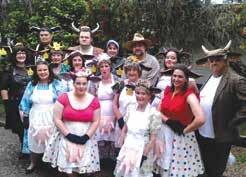


Top - Cast of Peter Panto 2010
Middle Left - Cast of An Unlikely Adventure 2014
Middle Right - Cast of Jersey Girls 2016
Bottom - Cast of Fiasco in the Forest 2019
As rich in history as the King Country and in particular Te Kuiti is, it’s no surprise the people of it have provided a richly diverse view of the arts.
This month it’s the 70th birthday of the On Stage Te Kuiti – and one where the club is ready to celebrate with past and present members, its longevity and history.
Back in 1954, there were two societies that ran parallel with each other according to current president Mary Macnaughtan.
One was Te Kuiti Choral and Operatic Society and the other, Te Kuiti Repertory Society.
It was at the same time that Noble and Dorothy (Dot) Smith headed a band of volunteers to put in place the fundraising required to get a small, purpose-built theatre into the Waitomo Indoor Sports Stadium in King St East that was being constructed at that time.
It took 12 years to do it, but by 1969, the society was able to move out of its old home in the Te Kuiti Civic Hall and into the base it still holds today in the indoor stadium.
Initially, the thespians were kept busy producing around three plays a year, Mary says.
“As early as 1980’s, with the changing social structure of the town, people moving o and going to other places, eventually both the repertory group and the Te Kuiti Choral and Operatic Society found themselves beginning to be lacking in numbers.
“We had talked as early as 1995 about the possibility of joining – and it made sense,” she says.
“By that time, we often shared the same members, shared costumes and makeup and such.”
So in 2008, it became o cial – Onstage Te Kuiti was born through the amalgamation of the two.
Throughout the 70 years, there has been some notable shows, and people who have gone on to become professionals in the world of theatre through to television.
“Perhaps our best show was “Our Town”, which we played in 1983 – Dot Smith produced that. It’s one of the best plays ever written because it celebrates everyday life, and it can relate to any time period.

We at the CAB congratulate On Stage on their 70th birthday and commend the organisation for its service to our community.
To enable us to continue to play our role in supporting our community, we always welcome new volunteers.
Helping others through the CAB is very satisfying. Please contact the Bureau, 222 Rora Street, Te Kuiti, phone (07) 878 7636 or email, tekuiti@cab.org.nz if you are interested or would like additional information.

“It went on to win a Theatre NZ regional drama competition, which was no small thing for a little repertory theatre like ours,” Mary says. It was later in early 2000, that the society hosted that regional competition.
Another major play that was produced twice the rst in the 1980’s, then again in the 1990s, was “Oh What A Lovely War”, based on the lm of the same name, which was a farce on World War 1. Before amalgamation, members of both worked with some well-known people. One of those, Mary says, was David Rossiter, a professional director who was taken on board to direct the musicals
“Joseph” and “Jesus Christ, Superstar”.
Over the years there were many locals who learned their ‘chops” on stage in Te Kuiti.
People such as Fiona Anderson who moved on into the TV industry, Jonathan Freebairn, and Clay Roberts (from Otorohanga).
The 70th celebration will be taking place on October 19 at the theatre.
“We will be putting the archives of everything we’ve done on display and then on the night of the dinner, both past and present members will take part in providing the entertainment. A smaller number of registrations from the last big 50th- but it will be a great night,” she says.
On-Stage Te Kuiti would like to take this opportunity to acknowledge the support of local businesses and the wider community in the past 70 years, Mary says.
“Without them local theatre wouldn’t have got this far. Special thanks to all the amazing volunteers, actors, crew, (on and o stage), who have contributed to showcasing theatre over so many years.”
She says it’s somewhat tting that the play which is currently in rehearsal for its opening weekend on November 8 is “Mama Mia”, with the ABBA music rst written 50 years ago,
“It’s a great time to be celebrating. While we have waxed and waned as a group, to have a 70-year history is still a real achievement and given the district a really solid aspect of the arts.”



9th & 10th









16th & 17th















•
•
•
•
•

•
•
•
By Doug Laing
The selection of the New Zealand Shearing team for the 50th anniversary trans-Tasman shearing and woolhandling series has been completed with the naming of two South Islanders last weekend.
They were the big winners at the New Zealand Merino Shears in Alexandra - Open shearing final winner Chris Vickers, of Shag Point, near Palmerston, and Open woolhandling final winner Pagan Rimene, of Alexandra.
Vickers will make up a three-man shearing team with Golden Shears champion Leon Samuels, of Roxburgh, and PGG Wrightson Vetmed National Shearing Circuit third placegetter Jack Fagan of Te Kūiti, while Rimene will be joined by North Island Woolhandling Circuit runner-up Ngaio Hanson, of Eketahuna.
The blade shearers will be South Canterbury pair Tony Dobbs, of Fairlie, and Tim Hogg, of Timaru, and the management will be shearing judge and manager Russell Knight, of Apiti, and woolhandling judge Rose Puha, of Kimbolton.
It’ll be a quick start for Dobbs and Hogg who will shear against Australian blades shearers Johnathon Dalla and Andrew Murray in the first test of the summer at the Waimate Spring Shears on Saturday.
There will then be separate machine shearing, blades shearing and woolhandling tests on the last day of the October 25-27 Australian National Shearing and Woolhandling Championships at Katanning, West Australia, marking the 50th anniversary of the first test in the series at Euroa, Victoria, in 1974.
Home machine shearing and woolhandling tests will be held at the Golden Shears in Masterton from February 27-March 1.
News/Editorial
080 6141
Advertising Director
Janine Davy janine@goodlocal.nz 027 287 0005
Owner/Publisher David Mackenzie david@goodlocal.nz Office 07 878 1188 reception@goodlocal.nz
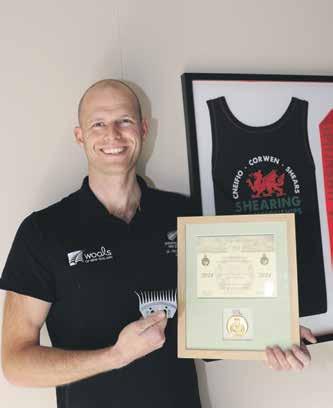
By Chris Gardner
Six hundred hikers are being invited to walk for a cause across a Wharepūhunga sheep and beef farm.
Geoff and Johanna Fitzgerald, who have farmed the 450ha Duncan Road property for 24 years, have created the Maungahau: Walk for a Cause charity walk and hikers can choose from a 6.5 km or 10 km cross-country walk on their sheep and beef farm on Saturday (October 19).
Walkers will pay $80 to complete and, if registrations are full, the Fitzgeralds will raise $48,000 for two good causes. The walks will also include the neighbouring farm owned by the Kimton family.
Proceeds will be split between Waikato Westpac Rescue Helicopter and Waikato Hauraki Coromandel Rural Support Trust.
The Fitzgeralds have benefitted from both services over the years.
“We have capped it at 600 walkers because of our health and safety plan that we have got in place,” Geoff Fitzgerald, 74, said.
The short walk is expected to take two to two and half hours, the long walk three to three and half.
“We hope to do it annually, give people a really good experience, and be able to increase the numbers next time.”
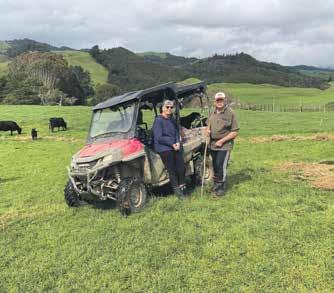

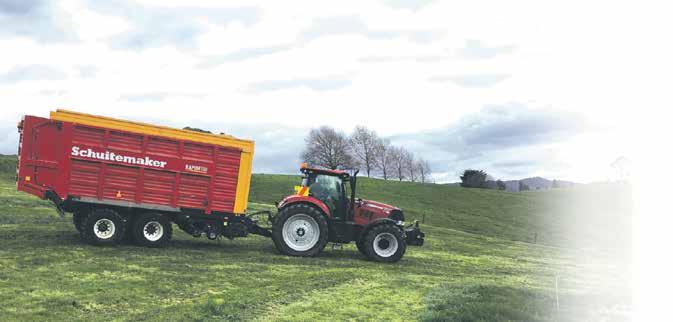







By Chris Gardner
Donald Trump has promised to introduce tariffs of up to 20 per cent on most imported goods if he returns to the White House next month.
But Federated Farmers Waikato meat and wool chair Reon Verry isn’t losing any sleep over the prospect.
“Politicians tend to make a lot of promises before an election,” Verry said. “New Zealand is a longtime ally of the USA. I’m sure there’ll be a few adults in the room to supervise whoever wins the election.”
Verry said he had more immediate issues to worry about, “and I don’t get a vote in the USA anyway”.
However, a blanket 10 per cent tariff on New Zealand exports to the United States could kill quite a lot of trade, warns Stephen Jacobi, executive director of the New Zealand International Business Forum.
“It would also engender a huge international trade war, which would be negative for everybody, not the least for the United States.”
Jacobi said New Zealand’s trade with the United States had been going “very positively”, despite the lack of a free trade agreement.
He expected the Government would challenge any tariffs imposed on New Zealand products.
Meat Industry Association chief executive Sirma Karapeeva said if a universal tariff was to be applied, hopefully it would be truly universal and also applied to countries that have free
trade agreements with the US, such as Australia.
“Who knows what he’s going to do, right? ... If it starts, that universal tariff, as targeted at only those countries which do not have a free trade agreement with the United States, then it gets even more complicated.
“The point that many seems to be missing... is that yes, tariffs add cost, but ultimately, the consumer in the United States misses out because their products become more expensive.”
Karapeeva said tariffs faced by the meat industry in the United States were currently “a bit of a nuisance” instead of prohibitive. Beef is charged at 4.4 cents a kilogram, and sheep meat at 2.8c a kilogram.
It would be for each meat producer to decide whether to continue shipping to the United States if a tariff were imposed, she said.
But the US had a lack of beef production, and a lot of New Zealand meat went into hamburgers, so there remained a need to backfill the demand.
“Will the US consumer change its eating habits because of a 10 per cent tariff? I don’t know.
‘But from the industry’s perspective, as long as the US is a competitive market and we can gain good returns for our products, companies will most likely continue to supply,” she said.
“As far as I’m aware, no decisions have been made, we obviously don’t know where this is going to land… We just sit tight and wait to see the results, and hope that sense prevails.”






He was the regional winner of the Waikato-Bay of Plenty young farmer of the year competition in 2020.
Now in 2024 Te Kūiti farmer Mitchel Hoare (pictured) is celebrating after winning the AgResearch Emerging Achiever Award after being one of three finalists.
The 29-year-old, who is sheep and beef farming on about 240ha at Rangitoto, was among the winners and the 2024 Beef and Lamb awards night in Hamilton last weekend.
Around 300 people were at the awards event which recognises people, technologies and innovations that contribute to the red meat sector.
The judges said Hoare was actively working towards farm ownership, was motivated and innovative, demonstrated experience and achievements within the sheep and beef sector as well as strong community involvement.
Hoare is no stranger to success. In 2015 Hoare and Maihiihi cadet Alex Reekers represented New Zealand at the World Young Shepherds Final in France.

By Paul Charman
Courage is a common requirement whether contesting high performance sports or farming in a challenging economic environment.
So says David Galbraith, a high-performance coach with 20 years’ experience working with top athletes within New Zealand and overseas.
Galbraith, who previously worked with fellow psychologist and author Nigel Latta, spoke at a field day held at Fernleaf Farms, Ohura, earlier this month.
Though still active as a consultant in his field, Galbraith moved from a farm at Marokopa several years ago and more recently to a sheep and beef property at Ohura.
He told about 40 people gathered at the field day that his current farming career fulfilled a dream held since teenage years; this was to both to own a farm where he could live and work with his elderly parents.
in one of the biggest companies in the word, are an Olympian or a parent.”
Galbraith was a “mind coach” for the All Blacks Sevens team over 14 years; he advised the Chiefs Super Rugby team for 11 years and was a performance coach to Japan’s Brave Blossoms rugby team for 2019 and 2023 Rugby World Cups.
He has worked with athletes ahead of four Olympic Games, his protégés achieving 12 gold, two silver and four bronze medals.
‘Whatever scares us about farming if we run away from it it’s not going to go away, it’s going to get bigger’ – David Galbraith.
There are parallels between high performance sport and farming, he told his audience.
“Courage is critical to you unleashing your mind and achieving your potential in either profession.” Galbraith said.
“It is courage you need to overcome a fear, to step outside your comfort zone, to keep moving, to be patient, to keep practising, trusting and investing. Courage is the most important emotion people need to learn to control their lives.
“It doesn’t matter if you are still at school, work
As a so-called “mind coach” he has assisted athletes including flat water canoeist Lisa Carrington; BMX rider Sarah Walker; Silver Fern Laura Langman; track and field athlete Sarah Cowley and slalom canoeist Mike Dawson.
“As a performance coach I support an individual to get the very best out of themselves,” he says.
“She may have worked 16 years but I may be working with her to focus it all on 35 seconds.
“Whether in elite sport or farming one must wake up in the morning and look at the world through the eyes of a five-year-old, because that is the kind of energy that will inform every interactions we have with others.
“We are like tuning forks; the way we resonate makes others resonate the same way.
“Every interaction you have when you meet people off farm is important, whether it’s getting tyres put on a truck or buying groceries at New World Taumarunui and talking to the checkout lady.
He likened every day to making a great chocolate cake – to be successful one needed to follow a recipe. To have a successful day one had to have a plan.
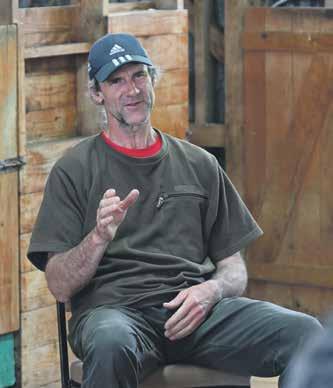
“I have spent 20 years helping people figure out how to get the best out of themselves.
“We all have potential but are we getting everything out of yourself you should be getting.
“Forget that you’ve done it for seven years; your job is just to do it today with the same energy. Our job is to wake up every day and make sure we’re in that space (to do that) once again.
to page 6
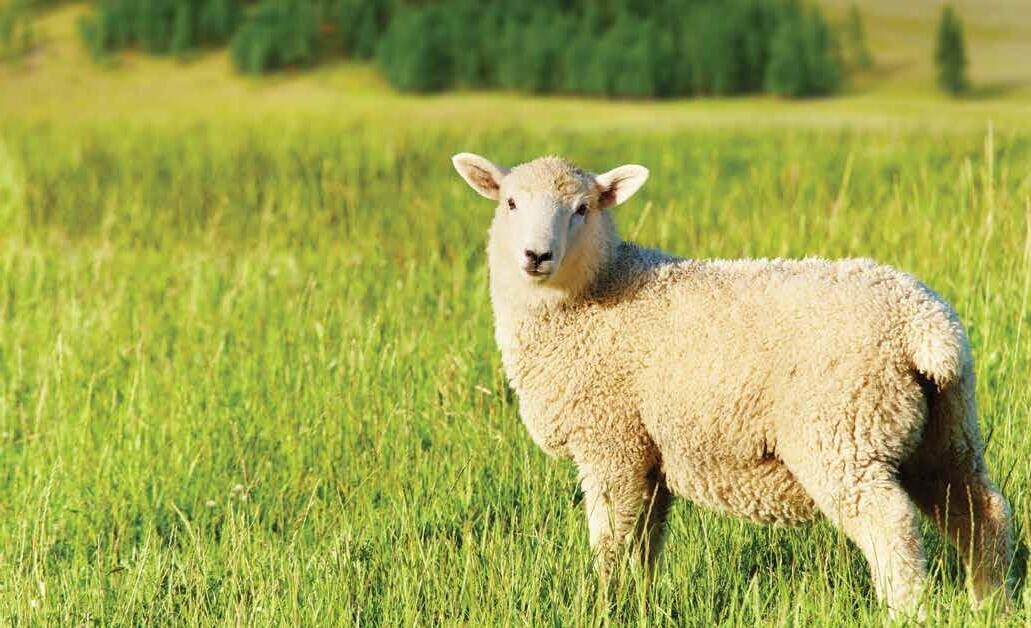
Rams also available for sale via



By Paul Charman
Te Kūiti stock agent and auctioneer
John Grainger was made a life member of the Te Kūiti Volunteer Fire Brigade at the brigade’s awards night this month.
He joined in 1989 as a fire fighter in his mid-twenties, immediately enjoying the camaraderie of working with the others and the excitement of being called to emergencies.
“At the back of it all you just felt the contribution you were making had some significance – that you were helping people in a time of need,” he said.
In 1991 his job took him out of town, but Grainger made sure to re-join the brigade when he moved back to Te Kūiti eight or nine years later.
More recently he spent three years in Taranaki, returning to Te Kūiti in June. What sticks in his mind after racking up a combined total of about 21 years as a volunteer fire fighter at Te Kūiti, 15 of which were spent as brigade secretary?
“I think it is how well Fire and Emergency looks after its people,” he said. Grainger was part of the brigade’s critical stress team, set up by the then NZ Fire Service to help fire fighters struggling to deal with disturbing aftereffects of fires, crashes and medical events.
This on-call group sent him out to visit colleagues following traumatic events they had experienced.
“You must remember volunteer fire fighters are just ordinary people who get thrown into situations which are far from normal.”
He completed a series of intensive psychological courses, training him how to assist those who’d been in grim situations. This involved travelling to see colleagues in centres as far away as Rotorua and the Coromandel. In 2018 Grainger received a Region 2 Safety, Health and Wellbeing award in recognition of his service.
“Following a bad incident, colleagues are referred by their chief, or sometimes by a partner or spouse. In most cases a chat with a colleague who understands what they’ve been through is all that’s required. When there are more issues we can bring in specialised counsellors or psychologists.”
Traumatic incidents could be compounded when parents, witnessed children being hurt; or when brigade staff came in contact with those they knew personally, which was always possible in a small town.
Counselling on offer could go wider that just work trauma, if need be touching on work and relationship issues.
“I was impressed at how deep and thorough the Fire Service was when looking after the mental health of their people,” Grainger said.
Was being a fire fighter a difficult life when it came to lost sleep?
“Yes, but it was just part of the job as a volunteer. I can remember getting home at five or six in the morning and then the alarm would sound to go to work.
‘But somehow you always seemed to get through. You couldn’t always go out on a call, of course, because for every-


one there are days when you just have to stay at work.
“Don’t ever underestimate the contribution employers make to maintaining our volunteer fire brigades. Employers are very good in this town – they are really the unsung heroes keeping our brigade going.”
What Grainger values most are the friendships he has made over the years.
“I have made some very good friends
in fire and emergency all over the country and my brigade has been a very caring one. I have had some very good chiefs who created a unit it was a pleasure to be part of.”
That said, the work remained a challenge.
“I think when I first joined we were doing 50-70 calls a year. Now it’s up to about 200 and for a little place like Te Kūiti that’s a lot of calls.”

Proud to offer a full range of contracting services to our local farming community.

ED MAIZE ANTED? us a call' SERVICES INCLUDE: Cultivation & Planting
• Groundwork
• Disc & Roller Drilling
• Direct Drill, Strip Till & Conventional Till
• Precision Maize Planting & Side Dressing
• Fertiliser Spreading
Baling (Silage & Hay)
• Rounds or Conventional Grass & Maize Silage
• Forage Harvesters (Grass & Maize}
• Mow/ Rake/Tedder
• Loader Wagon
• Cartage & Stacking
•Hiab Truck Available
Maize & Grass Silage Available Now




from page 4
He said this called for some realistic self-analysis to determine what one had to give.
He had seen rugby players with modest skills get to the top through focus and hard work, while others who very gifted were also lazy and never realised their potential.
“Most of us are on a continuum somewhere in between.”
On the importance of dealing with fear correctly, Galbraith related an experiment among people with a dread of snakes.
This measured activity in the fear-centre of the people’s brains, they were monitored as they were made to look at an image of a cobra.
They had a button to make it come closer or go further away, but had been asked to make it come closer.
“All had a fear reaction but those who faced their fears by making the cobra come nearer registered less fear than those who drove it away.
“Your cobra could be something like high inflation, rising interest rates or land prices.
“We’re confronted with snakes every day so we have to make a decision
whether we are going to step up and dance with that baby or push it away because it’s scaring the shit out of us.”
“Everyone naturally wants to escape from a crisis.
“But the strange thing was that fear levels were higher among people who made the cobra go further away than among those who invited it to come nearer,” Galbraith said.
“Whatever scares us about farming if we run away from it it’s not going to go away, it’s going to get bigger.
And in the end what brings you down will be the result of you running away instead of confronting your fears.
“If you run away the fear will still ooze out somehow, maybe through a broken marriage or a drinking problem.
“Instead, we must decide to be brave intentionally and confront our problems every day, because our brains are already pre-wired to be fearful and nervous.”
Galbraith said the key to overcoming fear was to make a plan and then regularly review how well one was sticking to it.
“This is courage in action; if you wake up to a plan and stick to it you are already exhibiting courage.”

By Stu Kneebone, Waipā-King Country Councillor
As we come out of winter and into spring, a reminder to landowners that that both the Waikato Regional Council (WRC) and the Waikato River Authority have contestable funding available to landowners to assist with restoration of wetlands, rivers and streams and steep and eroding land.
The WRC portion of this funding is sourced primarily from a targeted catchment rate that is applied depending on which catchment zone you are based in, plus a general rate contribution of approximately 15- 20 per cent. These rates are based on property value.
WRC funding is generally prioritised to the parts of the region’s catchments that have been identified as a priority for funding assistance. This is primarily about ensuring that our limited public funding is utilised effectively in a way that we can be confident will deliver results for the catchment as a whole.
The Waikato River Authority makes contestable funding available via its Waikato River Clean up Trust for restoration projects in the Waikato and Waipa river catchments. This funding was made available via a treaty settlement that was negotiated by Waikato River Iwi with the Crown in 2010, following recognition that the river was degraded, and should not have to accept further degradation as a result of human activities.
The Authority allocates approximately $6 million a year to restoration projects in the Waikato and Waipā river catchments. Its funding decisions are guided by the Waikato and Waipa river restoration strategy.
In the Waipā Catchment, Waikato Regional Council and the Waikato River Authority with the support of the MPI Hill
Country Erosion Fund can jointly support landowners via the Waipā Catchment Plan programme.
Up to 70 per cent funding assistance is available for undertaking works.

Landowners in the Kaniwhaniwha, Moakurarua, Mangarama, Mangatea, Mangarapa, Upper Waitomo and Upper Puniū catchments may be eligible for funding assistance.
The MPI Hill Country Erosion Fund is also available to landowners undertaking these works within the West Coast Harbour and southern catchments.
Type of works eligible for funding include:
• Fencing to retire steep/erosion prone land.
• Re-vegetation of retired steep/erosion prone land with a mix of native plants using small plant sizes to keep costs down.
• Planting of poplar poles to help stabilise land slips. Poplar poles come with a protective sleeve which allows grazing to continue.
• Fencing of wetlands and eroding streams.
• Planting of eroding streambanks WRC is keen to engage with landowners early to plan and prepare for next winter’s planting programme so plants, work programmes and associated budgets can be organised.
If you have areas on your farm that you are thinking about fencing off and planting, please contact us early to avoid missing out.









By Paul Charman
Parasite specialist Trevor Cook (pictured right) is a tireless ad vocate for drenching, man agement and genetics as the three-pronged means of fighting the New Zealand sheep industry’s pasture parasite problem.
The experienced vet and farm advisor has long warned of an over de pendence on chemicals due to growing drench resistance.
He gave the main talk at the Fernleaf Romneys field day on the Forlong family farm at Ōhura last week.
At this property Romney rams and sheep are bred with genetics offering inbuilt resistance to worms and facial eczema, needing little or no drenching, something Cook acknowledged as a vital component in the fight against parasites.

In the era of growing drench resistance, he saw little future for farmers dependant on drenching every 28 days.
In sharing basic guidelines for improved management, he recommended keeping in mind the number of lambs on any given property. The priority had to be how to mitigate the parasite problem in lambs because these are the most susceptible and the biggest contaminators. Male lambs are more susceptible whereas more mature sheep are much less. In fact, mature ewes can be used as one of the tools to break the contamination and exposure cycle.
“On our hill country there is an ongoing cycle of lambs contaminating and then being exposed to that contamination.”
Cook noted that though some species of dung beetles had been reported to be control agents for gastrointestinal parasites of livestock, they are not the panacea promoted and, in some cases, may improve the survival of the parasitic worms.
“In my view, if anything dung beetles can just open up to provide more oxygen to accelerate the growth of
When lambs are ingesting L3 larvae there is a decrease in their appetite which decreases their growth. Reducing the number of L3 larvae that lambs are ingesting allows them to grow
“Controlling worms will very simply result in them eating more and gaining more weight.”
On farms where drenches were failing Cook works out the opportunity to graze lambs on less contaminated pastures which then sets the number of lambs that the system can handle. This then requires a discussion about the sheep and lamb selling policy. The worm larvae mostly live in the lower couple few centimetres of the pasture where they are more protected from UV light which they do not like. Longer pastures favour the survival of the worm larvae. And in another interesting aside Cook noted that sheep seemed to be able to somehow detect the presence of L3 larvae in pasture, and – given a choice - preferred not to feed on it.
Pasture grazed by cattle can result in a lower worm challenge for sheep if for long enough.
“But unfortunately, running cattle concurrently alongside sheep does very little to reduce the worm count.”
Meanwhile, summer crops are hugely valuable in
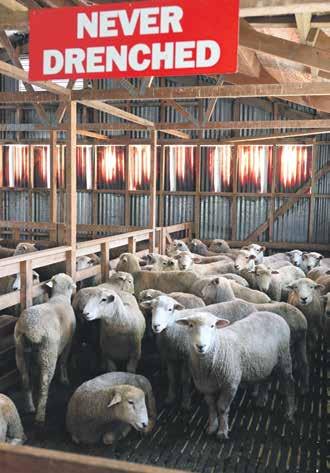
managing worms because the free-living stage of the worm cycle struggles to survive in them. What is more, contamination from lambs is concentrated onto the crop area and does not add to the overall farm contamination, Cook said. Parasites pose the problem, See Page 13













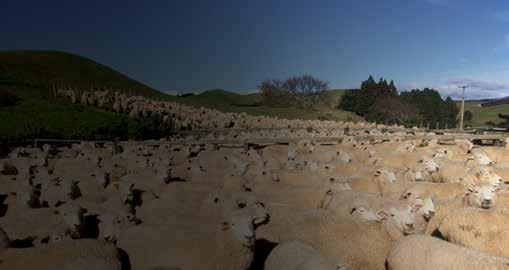





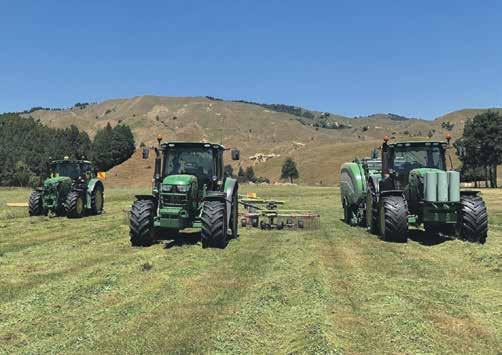



By Rosemary Longuet-Higgins, Veterinarian , King Country Vets
Finding the best and most helpful joint supplement for our active, aging, and arthritic dogs can be a challenge.
With our aging working dog and pet population, there are now many new options and much more reliable research available on treating and preventing arthritis at any stage.
Broadly, managing arthritis consists of a combination of the following: weight management, activity modification, nutritional supplements and medical interventions.
Pet joint supplements are growing, lucrative and poorly regulated industry. To ensure you are purchasing products which are most likely to be effective, it pays to know the principles of joint supplementation and to know the most helpful ingredients.
The goal of oral joint supplementation is to increase the omega 3:omega 6 ratio of fatty acids in the body.
Fatty acids (FAs) form the membranes of cells all around the body and are required in many body processes, including the pathways of inflammation involved in arthritis.
While omega 6 fatty acids are essential for the body, by increasing the amount of omega 3 fatty acids in relation to omega 6’s, the body produces less inflammatory compounds and thus less inflammatory discomfort is produced in the joints.
Omega 3 FAs are found in many different formulations, in both commercial pet and human supplements.


I would always recommend having a discussion with your vet before starting your dog on joint supplementation, to ensure you are giving an effective, but safe dose, and it will not interfere with any other medications.
General principles for canine joint supplementation that will help you select a joint supplement are:
• Fish oils are a much more potent source of omega 3’s than krill oil.
• The main omega 3 FAs are EPA and DHA. Dogs cannot process ALA, which is found in flaxseed, linseed and canola oils.
• Look for supplements with antioxidants in them – these preserve the fatty acids for use in the body, rather than degrading in the packaging before use.
• Check the concentration and dose of DHA and EPA in the supplements you are buying – for example a 20kg dog needs a dose of about 2000 milligrams of EPA + DHA daily for it to be effective. Don’t forget – arthritis management is about multimodal care - talk to your vet about activity modification, physiotherapy, weight management and medical interventions to keep your dog comfortable and active in the face of arthritis.
FENCING












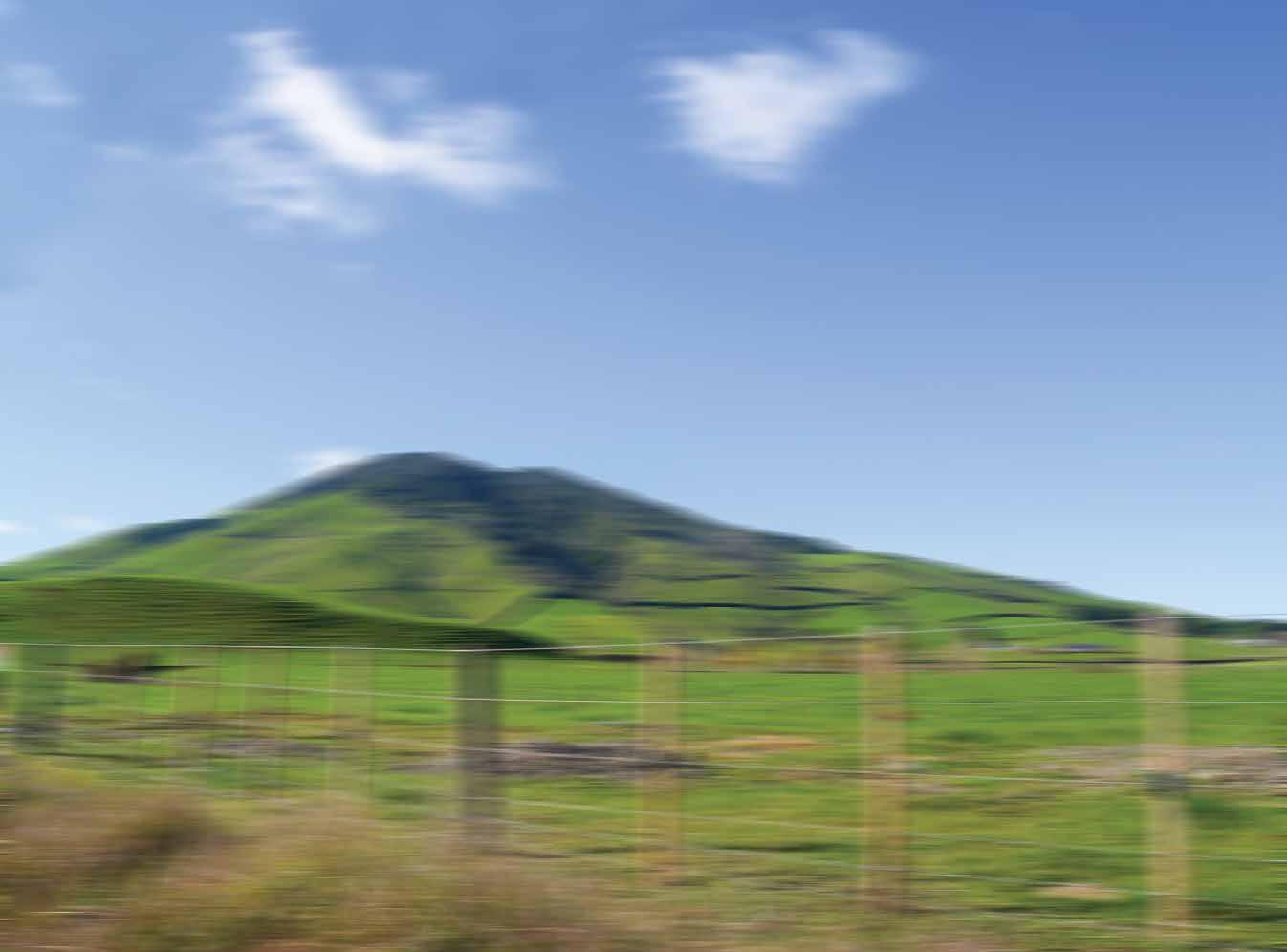
By Chris Gardner
It is no longer practical for members to bring every issue to Federated Farmers Waikato.
“We have so many things we have to deal with,”
Holmes told the September meeting of the provincial executive.
“The act of bringing it all through the chair is really not practical anymore. We have to think differently.”
In this monthly report he said because the workload was so large, he had expanded portfolios.
“Within the sectors we also have to give more autonomy for the actions and outcomes from the working groups.”
By way of example, Hamilton branch chair John Bluett had sent a submission to the Government on the future of agricultural education post Te Pukenga.
“The consultation was with those of us who have an interest in the subject,” he said. “I was very impressed with the submission, especially given the short time we had.”
Holmes asked members to become nimbler and more responsive, attaching members to interest groups.
“Democratic decision making comes in many forms – but it should never revert to the ‘sludge’ of local body consultation, with no decisions ever being made,” he said.
Holmes described the advocacy Waikato Federated Farmers was involved in as selfless, demanding and relentless, in terms of workload.
“The wins are there to be seen and coming fast,” he said, listing a pause on the fresh water farm plans, re-opening the doors for livestock exports, reviewing the carbon and ethane solutions, opening to the opportunity of the use of gene editing technology and de-clogging the barriers to opportunity, innovation and consent procedures.

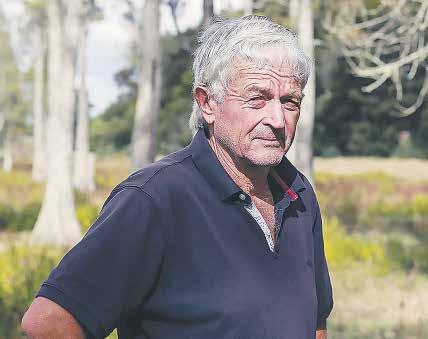
“Significantly the rebuilding of the Resource Management Act version 3, is also giving back to farmers their lost ‘property rights’, taking back the invasive overreach of the concept of Significant Natural Areas and posing the question of who should pay for ‘the Society Wish List’ as we know as farmers we simply can’t and shouldn’t be seen as society’s Golden Goose or cash cow.”
Holmes empowered section and branch chairs to engage in member advocacy.
“I have had a discussion with Dairy vice chair Louise Gibson about what sharemilkers are doing,” he said.
The Sharefarming Consultants founder Gibson, a former Federated Farmers policy advisor, is focussed on ensuring contracts between farm owners and sharefarmers don’t have any fishhooks
“We trust Waitomo branch chair Chris Irons,” Holmes said. “It’s the same with, and Arable chair Donald Stobiet.”
“We have to be careful we don’t rely too much on individuals,” Irons said. “We have to be nimble and pull people in.”
Federated Farmers Waikato president Keith Holmes has painted bleak picture of the agriculture sector.
“Farmers aren’t making money, and the Rural Support Trust is busier than ever,” he said.
He said Waikato Federated Farmers was deeply worried and was focussed on getting profitability back into farming and for farmers.
“Returns and product prices will always be in the media headlines, however, it is the insidious, rampants increase in costs that has destroyed the viability of our farming enterprises.
Farming has been the backbone of the New Zealand economy, still is and will be for our lifetimes.”
Holmes, a former Karapiro dairy farmer turned sheep, beef and cropping farmer, said a $2 per kilogram of milk solids increase in dairy farm operational costs over seven years had sucked the innards out of dairy farming. Arable, beef and sheep farming operations had fared no better.
“Farming must have profit to reinvest, to pay staff and keep the banks off our backs. The stupid narrative of ‘breaking-even’ must stop.
“Breaking-even is merely sliding into inevitable foreclosure.
“The narrative needs to be that ‘profit is healthy and necessary’ to drive both our own businesses and the greater Waikato economy.”
Holmes said Waikato Federated Farmers was committed to rolling back the “colossus of stultifying costs, such as unnecessary compliance, unnecessary data collection”, and driving bureaucratic efficiencies.
“We have and will continue to interface with Waikato Regional Council, in an effort so far successfully to work with them to reduce costs and create mutual understanding.”






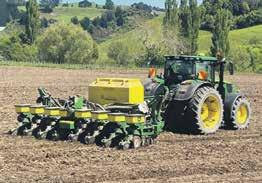

Farmers are pay for capital projects and manage debt repayments using overdraft facilities, a Federated Farmers survey of farmers has found.
Twelve percent of farmers who responded to the Fed’s survey said their bank had asked them to fund capital work using an overdraft.
Federated Farmers banking spokesperson Richard McIntyre says that’s unacceptable and overdrafts should be a tool, not a trap
“Overdrafts are designed for managing seasonal cash flow, not to burden farmers with higher-interest debt, which only serves to boost bank profits.”
He said farmers were stuck in overdraft facilities that never returned to positive balances and banks were reluctant to offer more sustainable solutions.
A key finding presented by Federated Farmers in a submission to Parliament’s banking inquiry was that more than one in five farmers said their bank did not allow them to structure their debt in the most interest-efficient way.
“New Zealand farmers are clearly under huge pressure from the banks because we had more than 1000 farmers come forward to share their frustrations with us,” McIntyre said.
“We’ve used that feedback in our submission, leaving the select committee in no doubt about what farmers are dealing with and how banking issues are affecting them.”
It was highly concerning to hear 22 per
cent of farmers had not been allowed to structure their debt to minimise interest payments as much as possible.
“We also had another 18 per cent of farmers tell us they’re unsure of their options.
“In total, 40 per cent of farmers either find their debt structure inefficient or aren’t receiving the information they need to improve it.
“That’s something we need this inquiry to sort out - and fast.”
Another recurring theme in farmer feedback was a lack of transparency and a one-size-fits-all approach banks take to lending.
This created a cycle of high-interest debt, leaving farmers financially strained over the long term.
“This isn’t just bad practice - it’s bad faith,” McIntyre said.
“Banks are prioritising profits over the long-term financial health of New Zealand’s farmers.”
Farmers reported that even when it made good business sense, they were unable to convert overdraft debt into term debt.
“The advantage for the bank is that overdrafts generate higher interest, and banks can call in the debt at any time,” McIntyre said.
“This practice leaves farmers vulnerable, with overdraft rates often 3-4 per cent higher than term debt.”
Federated Farmers is calling for banks to provide fair access to more efficient

debt structures, particularly term debt, which would allow farmers to plan for the long term.
“Farmers aren’t asking for special treatment,” McIntyre said. “We just want a fair go.”
Federated Farmers has been instrumental in securing an initial briefing on rural banking, led by the Primary Production Committee.
This has now developed into a full inquiry into banking competition, led by Parliament’s Finance and Expenditure


Committee.
Federated Farmers will ensure farmers’ perspectives are taken seriously, pushing for real changes in New Zealand’s banking system, McIntyre said.
“Farmers want change, and they’ve added significant weight to our submission.
“We’re not just here to highlight the problems,” McIntyre said.
“We’re here to advocate for real solutions that will make a difference for every farmer in New Zealand.”
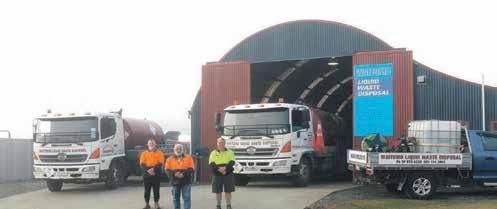










Waikato Regional Compliance Manager Patrick Lynch has declared that can be “no tolerance” for a failure to manage farm effluent.
He was commenting after a Waikato farming company, a company director and a farm manager were fined almost $306,000 for discharging effluent into the environment.
Flint Farms Limited, farm owner Barry Flint and farm manager Gavin Flint were sentenced by Hamilton District Court Judge Melinda Dickey last month on 14 charges under the Resource Management Act as a result of a prosecution taken by Waikato Regional Council.
It was the biggest fine for discharging contaminants into the environment in the Waikato region since the Resource Management Act was introduced over 30 years ago. “It’s 2024. There simply can be no tolerance for not having adequate infrastructure on farm to manage animal effluent,” Lynch said.
He said the size of the fine was a warning “to those farming operations who still have shoddy systems, or are not managing effluent systems properly.”
In addition to the fines, Judge Dickey issued an Enforcement Order against Flint Farms Limited requiring them to upgrade the farm effluent system and implement an effluent management plan to avoid further adverse effects on the environment.
In August 2022, council officers inspected the dairy farm owned by the defendant at Ngātea, south of Thames.
They found numerous breaches of environmental regulation, related to the discharge of dairy effluent from two effluent ponds, a sump and a stock underpass.
Two abatement notices were issued to prevent further discharges into the environment but during follow up inspections over the next 10 months, additional breaches were identified.
“This region has had clear rules in place for the last 30 years prohibiting this kind of activity,” Lynch said.
“It is very concerning that we still find contamination like this, even after putting a farm formally on notice.
“To need a court order to ensure appropriate infrastruc-
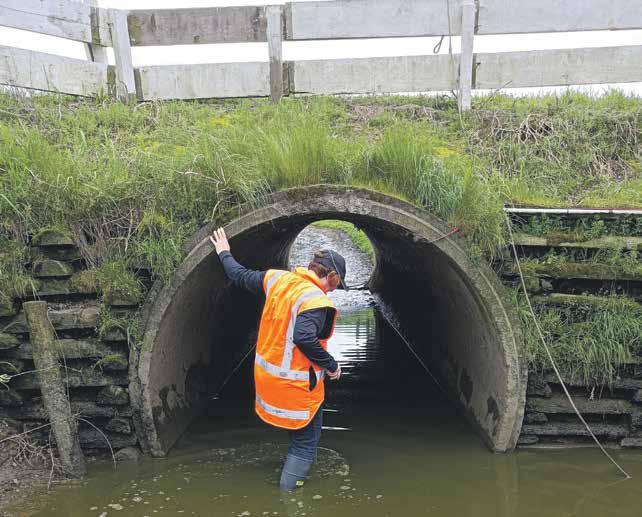
A regional council officer inspects a stock underpass. ture is installed, that should have been in place decades ago, is incredibly disappointing. “But those are the lengths we are having to go to in situations such as this to get some farming operations to do the right thing.”




• Kuhn Combi Round Baler / Wrappers - Net / Film on Film option
• Case Big Square Baler & Wrapper
• Forage Harvester with Trucks or Tractors / Trailers
• Full Mowing Services
• Bale Stacking


Striptill Maize Planting

By Chris Gardner
Growers are thinking twice about planting maize with wholesalers withholding contracts ahead of a looming natural gas supply shortage.
New Zealand’s natural gas production is declining with reserves dropping by 20 percent in the year to January 2024.
The shortage means the likes of wholesalers PGG Wrightson Grain and Viterra are not offering contracts to growers.
“PGG Wrightson Grain and Viterra both use gas to dry grain with,” said Federated Farmers Waikato Arable chair Donald Stobie in his September report.
“At the moment they both say that they currently cannot get a gas supply contract for next year. They also both say that the lead time is too short to change to a different fuel source to use at drying time.
“It is proving very hard to get a maize silage or grain contract, with end users holding off to see how the season ahead plays out. It will be interesting to see how much maize silage and grain gets planted.
“That question will come down to the financial situation of each grower.
How much finance do they require to grow these crops? Will a lender provide that money without a contract at planting time?”
The News sought comment from PGG Wrightson Grain and Viterra.
It’s been a roller coaster year for growers. Prices were good a year ago, with Niwa predicting a drought. But prices dropped when the drought did not eventuate.
“By the time harvest had finished if you had a crop sale you may have thought you were lucky - although some of those sale prices were at levels that growers are probably losing $1000 to $1500 per hectare.”
Crop yields were up about 8 to 10 per cent, maize silage sales had pricing as low as 15 to 17 cents per kg dry matter standing and maize grain pricing down to


$300 per dry ton delivered to the silo.
“A number of growers did decide that these prices were too low so they either stacked maize silage or harvested the grain and are storing it at their own expense,” Stobie said.
“For all growers this overhang is a problem as it has kept a lid on demand and pricing for the new season.
“From a feed sale view the summer, autumn and winter has been far too kind with too much grass growing and there is very little demand for this extra feed that is around at the moment”.
Fonterra and its customers focusing on emission
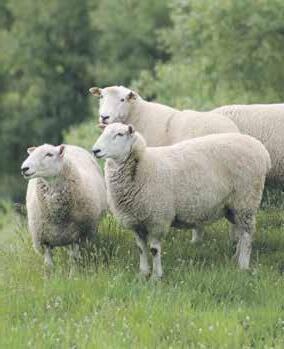

intensity per unit of production, maize grain could become a more attractive option compared to palm kernel, which has a higher emission rating. A shift of just 10 per cent from palm kernel to maize grain could boost demand by approximately 20,000 tons.
Waipā District based agricultural contractor John Austin, who grows about 6000 tonnes of grain on 500ha every year, said the industry had been discussing the gas shortage for months.
“It does not make sense to me,” he said. “As a contractor it really concerns me because we really need the work.”
















































By Paul Charman
Pasture worms represent the lion’s share of the animal health spend per farm, which is slightly under $24,000 a year.
The figure includes not only drenches but also facial eczema treatments and vaccinations, lice treatments and so forth, but Beef+Lamb’s Dan Bier says pasture worms clearly head the list.
“When we talk to farmers about their on-farm challenges they confirm that parasite management and parasite resistance are always number one production challenges,” he says.
“When you put aside the carbon farming and other issues these are always right up there. Parasites slow down the growth rate of stock and reduced their condition, representing a significant cost you have to buy a tool to deal with.”
be they’ll clean out a big chunk of those parasites so this will reduce the pressure on drenching.”
Crops were another important tool; farmers can use things like lucerne as a way of reducing the parasite loadings
“There’s an old saying the worst thing on your farm for one lamb is another lamb.
“The golden age of cheap and effective drenching is over...”
Bier, who is the chair of NZ Wormwise, says throughout the country wet summers favour trichostrongylus build-up; bad outbreaks of this worm occur the following autumn and early winter as high numbers of larvae on pasture are consumed by lambs.
And trichostrongylus larvae can survive freeze and thaw cycles, so a couple of frosts will not kill them.
“I suppose you could say wherever you have grazing ruminants you’ll have parasites. Farmers have known for generations that there are parasites affecting their animals and we have to manage them.
Over the years we have had different ways to do that such as drenching with copper sulphate and nicotine in the old days.
“Chemicals have worked very well since the 1980s but now we’ve managed to wear them out, just like antibiotics. It’s clear that when you expose a population to something that will kill most of them only the ones which are resistant survive. We have done that with our sheep and cattle drenches.
“The problem now is that we have taken those very few (parasites) that were resistant to the drenches and made them a bigger chunk of the population, so the golden age of cheap and effective drenching is over.”
Bier says the challenge now is to take what is known about parasite life cycles and how they live on the pasture and then give farmers as many tools as we can to deal with those.
“The problem is on all farms to varying degrees, albeit with more parasites on farms with younger animals because they have less natural immunity. So we don’t really see parasite problems on dairy farms where mostly they have adult cows.
“But we do see really high parasite counts building up on land finishing blocks where they just have lots of young lambs or heifer growing blocks for dairy or beef farms, where they have young cattle in a big lot without very many adults. We can see those shoot up really quickly and get very high numbers.”
He said he agreed with Melvin Forlong, of Ohura, that breeding was a good way to manage the parasite problem.
“We are moving from farm systems that relied on drenches to farmers thinking in a much more integrated way on how they manage parasites on their properties. As well as breeding there’s matters like how you integrate adult with younger stock on your sheep and beef on other property.
“Farmers are thinking a lot more clearly about this. So rather than just having a place where the calves always go, that may be a couple of times a year they work their beef cows through there as well just to clean up the parasites. And it’s the same with these lamb finishing blocks.
“Rather than just dumping lambs in the same paddock year after year, they’ll be thinking about how they can manage animals that don’t need drenching through those to clean up the larvae on the pasture.
“Sheep and cattle generally have different parasites. So, if you have a lamb finishing block and you graze cattle through it then they’ll eat up all or a big chunk of the sheep parasites and not be affected by them.
“Also the older animals are key. Adult ewes generally won’t need drenching. And so, if you’ve got a lamb block and you can work your ewes through it once or twice a year then may
“More and more farms are looking at how they can get those lambs off their farms as soon as possible.
“Grow them quickly and get them off to the works. From weaning to slaughtering lambs is three months during which you might traditionally have given them three drenches.
“But if you can reduce that to six-weeks you’re reducing a lot of drenching.
“In the King Country we see a lot of farmers breeding and finishing their own lambs.
But maybe we’re seeing more people make a clear decision at weaning time like – I am going to keep the top 60 per cent of my lambs. And all the bottom ones that would have been around for three, or five or six months, I’ll get rid of them now.
“So, they won’t need drenching – they can go to some finishing block somewhere else where somebody has a more specialist setup.
“So they won’t have those lambs hanging around in the summer and autumn which is when those parasite problems build up.
“At Wormwise we aim to use drenching as little as possible. It’s a tool you will have to use but if you can put all these other measures together you’ll really reduce the necessity to lean on those drenches.”
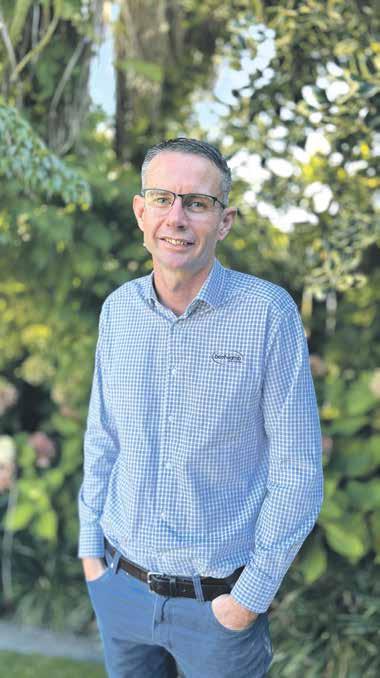

There are many reasons for couples to contract out of the equal sharing provisions of the Relationship Property Act (RPA). You might think you need a quick document drawn up and signed, but the law says, “Woah there, cowboy! You should get legal advice to check it’s what you want first.”
The RPA states that your contracting out agreement (COA) is void unless you receive advice from an independent lawyer on the effects and implications the agreement has on your property rights under the RPA before you sign.
There are three key steps you must take before signing the COA for it to be valid:
1. You must each have your own independent lawyer. Generally, this means the lawyer advising you on contracting out should not have previously acted for your partner.
2. T hrough lawyers, each party exchanges statements showing balances and values of all assets and liabilities. If significant property is not disclosed, there is a risk that a court could overturn the agreement.
3. Once your lawyer has the details of all property owned by each of you, they can assess what your rights would be if that property were divided under the RPA and provide you with advice on how the agreement affects your property rights and the implications if property were divided under the agreement.


Federated Farmers says it agrees with the government that it is timely and worthwhile to review New Zealand’s overseas investment settings.
“It’s alarming and regrettable the OECD has rated us 35th out of 35 countries in terms of openness to investment,” Federated Farmers meat and wool chair and forestry spokesperson Toby Williams said.
“As a small nation, capital and investment from overseas can help New Zealand to fix infrastructure and drive industry development.”
Federated Farmers agrees the Government should
retain the legal option of screening those investment types currently screened, including the sale of farmland, to ensure they are in the national interest.
“However, fast-tracking the overseas investment assessment process when no risk factors have been identified, and consolidating the investor, benefit and national interest tests, also makes sense,” Williams says.
“We understand the farmland test can take as long as two years from application. It’s such a long-winded process that investors can lose interest and pull out.”
The delay and costs were a real deterrent to potential offshore investors who wanted to invest in farmland, and keep farming it, rather than converting it to forestry - applications for which are currently processed faster, he said.
Williams doesn’t see any risk the proposed changes to the Overseas Investment Act will accelerate conversion of farmland to forestry.
“The land use changes we are seeing are due to settings with the ETS distorting the profitability of one land use over another.”
Next Generation Apples won the Primary Sector Award category at the 2024 New Zealand Food Awards in Auckland last week.
The company launched a new apple variety last year.
Sassy was by Plant and Food Research and grown and marketed by New Zealand-based growers Next Generation Apples, comprising Golden Bay Fruit and Taylor Corp.
“Sassy Apples were developed through plant-breeding techniques to create an apple with a crisp texture, high flavour, long storage and shelf life, novel skin and flesh colour, optimal harvest maturity, and pest and disease resistance,” Vincent Arbuckle, deputy director-general of New Zealand Food Safety, said.
“It is exciting to see how investment in research can lead to practical advances without sacrificing on bite or flavour.
“Sassy Apples are an example of excellence across the supply chain – from research to the orchards, to our

supermarkets. Our judging panel for the Primary Sector Award noted the impressive research and innovation behind this product.”
The other finalists were Waitoa Free Range Chicken, Good Guise Paneer and Akaroa Salmon.
“Finalists demonstrated a commitment to the kind of quality and ability to overcome challenges which has always formed the foundation of New Zealand’s food production,” Arbuckle said.
The New Zealand Food Awards are held annually by Massey University to celebrate food and beverage excellence and innovation.
Ends New Zealand Food Safety/Ministry for Primary Industries (MPI) has been involved with the awards for more than 20 years, and has been a sponsor since 2008
Vutter Avo Spreadable – a dairy-free butter, produced by Feliz Wholefoods – took out the 2024 Supreme Award.




The Sassy apple is described as sweet wit zing.



























PROPERTY YOUR REAL ESTATE GUIDE TO THE KING COUNTRY





It’s hard to find a four-bedroom home of this caliber, in a great location and one that doesn’t require maintenance from the get-go, so we are confident this one will sell quick.
An open plan living space offers a modern kitchen with island breakfast bar and raked ceilings for a pop of warmth to the stylish white finish and having a wood fire is often high on a buyer’s wish list. A generous deck is also covered and will be well used all year round in this fully fenced backyard.
The main bedroom is a great addition to the original design and has two double wardrobes for plentiful storage and potentially all the kids could have their own room or keep one as an office. This home is fresh, light and beautifully presented and ideal for a multitude of buyers from first time nesters to investors. Cash in your kiwi saver, call your mortgage broker, this is one property you won’t want to miss.
For more information or to arrange a private inspection, contact us now!



LOCATION | 63 Haerehuka Street, Otorohanga
LAND | 819m²
HOUSE | 3 bedrooms, 1 bathroom, 1 toilet, 2 car garaging
PRICE | $585,000
LICENSED AGENT | Harcourts Otorohanga
LICENSED SALESPERSON | Kerry Harty 027 294 6215 | Karen Lennox 027 5594 468
WEBSITE | Harcourts.co.nz
WEB ID | OH22524
OPEN HOMES: Sunday 20th Oct, 12.30 - 1pm
Ōtorohanga 21 Haerehuka Street For Sale $660,000 View By Appointment blueribbonharcourts.co.nz/property/OH22532 Be in for Christmas Blue
There's so much scope to further enhance the style of this solid 1950's home which would be ideal for buyers with creative minds and a flair for design, both inside the home and in the beautiful, newly established gardens, and mature trees.
This house has amazing bones, with generous room sizes including the kitchen, dining and separate lounge with timber flooring throughout. A unique layout with a covered sunroom/family room which links to the bedrooms and dressing room attached to the main bedroom. Two bathrooms, ideal for family living with internal access to the basement garage.
Hidden away from the road, this property has privacy and a large front lawn that would be a great place for additional living such as a tiny home tucked into a beautiful garden setting. A popular street, handy to the playground and a very short walk to town too. The scene has been set here and it's ready to be taken to the next level. Book a viewing today and let your imagination run wild.


Karen Lennox M 027 559 4468 E karen.lennox@harcourts.co.nz
kjharty@harcourts.co.nz











2.00 – 2.30pm 48 Davies Drive $589,000 4 1 blueribbonharcourts.co.nz/OH22527 2.45 – 3.15pm 102 Amopo Street Deadline 2 blueribbonharcourts.co.nz/OH22528
11.00 – 11.45am 363 Limeworks Loop Rd $975,000 5 2 blueribbonharcourts.co.nz/TA23655
11.00 - 11.30am 1980 Kakaramea Road Deadline 3 2 blueribbonharcourts.co.nz/TA23529
11.30 – 12.00pm 5 Glendon Place Deadline 4 2 blueribbonharcourts.co.nz/TA23597
– 1.00pm 63 Haerehuka Street $585,000 3 2 blueribbonharcourts.co.nz/OH22524
– 1.45pm 38 Gradara Avenue $695,000 3 2 blueribbonharcourts.co.nz/OH22522 2.00 – 2.30pm 5 Sargent Place $690,000 3 1 blueribbonharcourts.co.nz/OH22525
11.00 – 11.30am 40 Awakino Road $320,000 2 2 blueribbonharcourts.co.nz/TA23593 12.00 - 12.30pm 6 Ngatai Street $739,000 4 1 blueribbonharcourts.co.nz/OH22494 12.45 – 1.15pm 29 Ailsa Street $372,500 3 1 blueribbonharcourts.co.nz/OH22483
3.00 – 3.30pm 21C Anzac Street $319,000 2 1 blueribbonharcourts.co.nz/OH22523
Te Awamutu
11.00 - 11.30am 1644 Te Rahu Road $985,000 3 2 blueribbonharcourts.co.nz/TA23684
11.45 - 12.15pm 19 Hiskens Place $620,000 3 1 blueribbonharcourts.co.nz/TA23549
12.30– 1.00pm 360 Racecourse Rd Deadline 4 2 blueribbonharcourts.co.nz/TA23683
12.30– 1.00pm 249 Mutu Street By Neg 3 3 blueribbonharcourts.co.nz/TA23656
12.30– 1.00pm 5A McAndrew St, Kihikihi By Neg 4 2 blueribbonharcourts.co.nz/TA23667
1.00 – 1.30pm 2/70 Fred Parsons Court $449,000 3 1 blueribbonharcourts.co.nz/TA23595
1.00 – 1.30pm 403 Gleneagles Drive $885,000 4 2 blueribbonharcourts.co.nz/TA23654
1.00 – 1.30pm 216 Brady Street $675,000 3 1 blueribbonharcourts.co.nz/TA23652
1.15– 1.45pm 2/105 Douglas Avenue $525,000 2 1 blueribbonharcourts.co.nz/TA23674
1.15– 1.45pm 28 Wikaira Road By Neg 4 3 blueribbonharcourts.co.nz/TA23647
1.45 – 2.15pm 73 Raikes Avenue By Neg 3 1 blueribbonharcourts.co.nz/TA23579
1.45 – 2.15pm 902 Pakura Street By Neg 4 2 blueribbonharcourts.co.nz/TA23679
2.00 – 2.30pm 140 Stark Street $879,000 3 2 blueribbonharcourts.co.nz/TA23649
2.00 – 2.30pm 248 Parawera Road $1,480,000 5 2.7Ha blueribbonharcourts.co.nz/TA23576
2.00 - 2.30pm 161 Ohaupo Road $589,000 2 blueribbonharcourts.co.nz/TA23626
2.30– 3.00pm 9B Ballance St, Kihikihi $789,000 3 2 blueribbonharcourts.co.nz/TA23678
2.30– 3.00pm
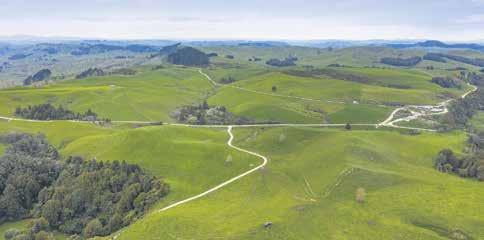
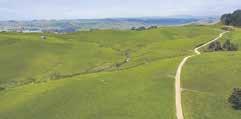
TE KUITI 386 Troopers Road
Ruanui Farm - 414 hectares (more or less)
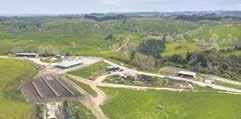
$6.25M
Dual purpose dairy and support property. Wintering approximately 525 cows, and normally 280 R2 Heifers for export - maximum 485 cows milked under current ownership. Last four years production ranges from 120717kg MS to 139803kg MS. This year’s production is up 36%. 170 hectares dairy platform, 194 hectares support and 50 hectares bush including QEII. The dairy platform is primarily on the plateau country and the dairy support to the north of the farm. Good water, races, three houses, 40 ASHB and feed pad. This farm has been faithfully fertilised over the years.
pggwre.co.nz/TEK40171
E pwylie@pggwrightson.co.nz M 027 473



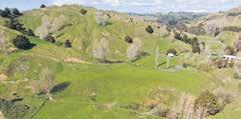
TAUMARUNUI 162 Okahukura Saddle Road
Small Farm / Large Lifestyle
This small farm offers an opportunity to embrace a rural lifestyle while still enjoying proximity to the amenities of Taumarunui. Ideally situated approximately 12km from the vibrant Taumarunui township and spanning 30ha, this property features a solid 1990s brick home with three spacious bedrooms and a practical 2-bay garage with sleepout. A half-round barn has been converted into a 1-stand woolshed.
Approx 1.5ha of flats, the rest features a mix of clean medium hill country with some steep country at the back, and is divided into 11 well-fenced paddocks.
pggwre.co.nz/TEK40308
TENDER
Plus GST (if any) (Unless Sold Prior)
Closes 11.00am, Wednesday 6 November VIEW 11.00-12.00pm, Wednesday 23 October
M 027 654 7434
E tony.foreman@pggwrightson.co.nz
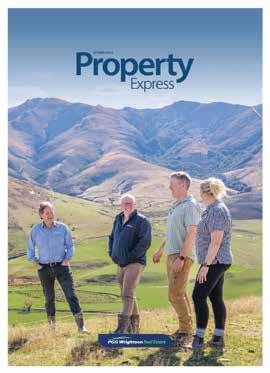





























































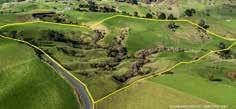














627
Otorohanga, 8105sqm rural lifestyle section. Phone Julie $370,000 Lots 90-108 Harpers Avenue, 486sqm to 962sqm, Westridge II subdivision. Phone John From $220,000ea 576C Mangawhero Road, Otorohanga, 1ha, fenced, sensible covenants. Ph Noldy Offers over $385,000 Te Kūiti sections (sizes are approximate)
5 Robin Azariah Place, Te Kuiti, 906sqm, quiet neighbourhood. Phone Buzz. Offers over $199,000
54A Ailsa Street (Lot 1), Te Kuiti, 2159sqm, end of a cul de sac, STT. Phone Buzz By Negotiation 54A Ailsa Street (Lot 2), Te Kuiti, 1707sqm, end of a cul de sac, STT. Phone Buzz By Negotiation
10 Robin Azariah Place, Te Kuiti, 600sqm level section. Phone Buzz $239.000 Other sections (sizes are approximate)
0 Raglan Road, Kawhia, 2648sqm lifestyle section, no covenants, completely off grid. Ph Julie $340,000 neg 147 Maukutea Drive, Kawhia, 600sqm, covenants apply, services at drive, water tank on site. Ph Julie $375,000 1961 SH31 Kawhia Road, Otorohanga, 16.95ha, bikes, sheep or building site options.







































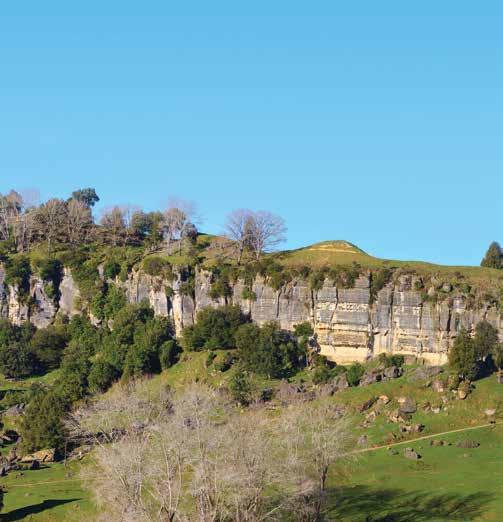

Consisting of 244.39 hectares (more or less) 23 km south of Te Kuiti on State Highway 4. A 2016 modern brick home, large living areas, three bedrooms plus an office and internal two car garaging. The second dwelling is an older home, four bedrooms with separate two car garage. Ample shedding, good balance of contour, 1077 sheep and 220 cattle wintered all grass and in a normal year 3000 lambs finished and 250 cattle traded. Fenced into over 40 paddocks reliable reticulated water - all gravity fed. Excellent fertiliser history, four sets of yards and a three stand woolshed. Two purchase options available;
1. Entire property (244.39 ha)
2. 199 ha (more or less) excluding homes and woolshed












































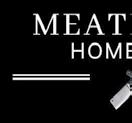


873 9190.


Friday, Oct 18
Special Entries:
A/C RD & L Oliver
22 Aut-Born 18mnth Hfrd/Frsn x strs
Contact Len Sheeran 027 473 5859

KŪITI CATTLE SALE Friday, October 18
Dave Rowe Painter & Decorator 027 290 8776 - 07 873 9104 decorator@daverowe.co.nz





873 7008
Start 12 noon 480 Cattle comprising: 15 MA cows 40 3yr Beef strs
150 2yr Beef, H/F, A/F, S Pk x strs
40 2yr Angus hfrs
30 18mth H/F x strs
50 1yr Angus strs
100 1yr H/F + C/F + A/F strs
50 1yr Beef + H/F hfrs

Servicing the Waipa and Waitomo districts for over 20 years




Property maintenance and construction
Lawns, trees, stump grinding, sections, moss & mould treatments, Chemwash, waterblasting, gutter vac, water tank and trough cleaning fences, retaining, odd jobs and more. References available GST registered.
Mike & Allana 027 350 0836 info@handy-man.co.nz

Anything too big for a shovel - give me a call • Vegetation removal • Driveway prep - Auger
• Landscaping • Trenching • Water tanks Manga Roach Ph 027 431 9959
• Phone our friendly staff 07 878 1188 or 07 873 7139
• Email your ad and billing details to reception@goodlocal.nz
• Our website contains all the relevant details plus much more at kingcountrynews.co.nz Need
• Call into our office 18 King St East, Te Kūiti









Piopio Aria Golf Club
Piopio Aria Golf Club
Piopio Aria Golf Club
Piopio Aria Golf Club
Piopio Aria Golf Club
Action Electrical

Action Electrical
Action Electrical
Action Electrical

Action Electrical

Christmas Hams Tournament
Christmas Hams Tournament
Christmas Hams Tournament
Christmas Hams Tournament
Christmas Hams Tournament
Sunday 3rd November
Sunday 3rd November
Sunday 3rd November
Sunday 3rd November
Sunday 3rd November
Gross, Nett and Stableford Prizes
This position is for 2 days per week, 6 hours each day. To be considered for this position you will need:
Gross, Nett and Stableford Prizes
Gross, Nett and Stableford Prizes
Gross, Nett and Stableford Prizes
Gross, Nett and Stableford Prizes
$30 Entry (Includes 2’s)
$30 Entry (Includes 2’s)
$30 Entry (Includes 2’s)
• Good reading, writing, spelling and numeracy skills
$30 Entry (Includes 2’s)
One Ladies Division
$30 Entry (Includes 2’s)
One Ladies Division
One Ladies Division
Division
Two Men’s Divisions
Two Men’s Divisions
Two Men’s Divisions
One Ladies Division

• Previous administration experience
Two Men’s Divisions
Non Handicappers Division
Two Men’s Divisions
Non Handicappers Division
Non Handicappers Division
Long Drive and Nearest the Pin
Non Handicappers Division
• Attention to detail with excellent accuracy in data entry
Long Drive and Nearest the Pin
Non Handicappers Division
Long Drive and Nearest the Pin
Long Drive and Nearest the Pin
Long Drive and Nearest the Pin
Tee Times between 9.30 – 11am
• Confidence in using technology
• The ability to work alone
Tee Times between 9.30 – 11am
Tee Times between 9.30 – 11am
Tee Times between 9.30 – 11am
Tee Times between 9.30 – 11am
Contact Wayne 027 378 6635
Contact Wayne 027 378 6635
Contact Wayne 027 378 6635
Contact Wayne 027 378 6635
Contact Wayne 027 378 6635

Āria Primary School
Principal:
Aria Primary School
Fixed Term Scale A teacher, year 2-4.
2025 - One year position commences beginning term one. Job share - a possibility. We are seeking a highly motivated and enthusiastic teacher who will inspire and motivate students to learn.
If this sounds like you then in the first instance give Debra a call on 027 287 5235 for a chat

Scale A Teacher Fixed Term (Maternity Leave position)
January 28, 2024 – May 8, 2026
0.5 permanent + 0.4 fixed term Scale A teacher, NE – Year 3 Position commences when suitable applicant is found. Job share - a possibility. We are seeking a highly motivated and enthusiastic teacher who will inspire and motivate students to learn. Strengths in working collaboratively, commitment to your own professional growth and strong classroom management skills are required. Our school has a passionate and supportive staff culture. We look forward to hearing from you.
Must have a strong curriculum knowledge particularly in literacy and numeracy. Strengths in working collaboratively, commitment to your own professional growth and strong classroom management skills are required.
Please send CV plus covering letter and names of two referees to The Principal, Āria Primary School, 17 Barclay Road, RD1 Aria 3979 or e-mail to office@aria.school.nz. For further information, contact the principal Pam Voyce. ĀRIA SCHOOL
Our school has a passionate and supportive staff culture. We look forward to hearing from you.
Please send CV plus covering letter and names of two referees to The Principal, Āria Primary School, 17 Barclay Road, Āria 3979 or e-mail to office@aria.school.nz.
For further information, contact the principal Pam Voyce. Applications close Friday, November 1, at 4pm.
We are a rural school with a roll of 25 ākonga. The position advertised is in a Year 0-3 class of 7 wonderful, enthusiastic learners. We are flexible in how we fill this role: We welcome either fulltime or part-time applicants for the fixed term. Our staff is a small team who work together to support each other and our ākonga. If you are a positive person, reflective, have a “can do” attitude and a growth mindset we would love you to apply. How to apply
For further information or to request an application pack contact: Maryann Symonds Tumuaki principal@mokau.school.nz 021 0251 2690

Details of upcoming meetings can be found at www.otodc.govt.nz/ about-council/meetings
Tanya Winter Chief Executive

www.otodc.govt.nz
Te Kumi A31 Te Korapatu Marae
102 Hangatiki East Rd, Te Kūiti
Marae Charter Wananga Hui
10am Sat and Sunday, November 2-3, 2024
Nau Mai Haere Mai Whanau, Beneficiaries of our Marae
We are updating our charter and hope you will join us on these two day.
Tomotuki Marae
Annual General Meeting (AGM)
Date: November 10, 2024
Time: 10am
Venue: Tomotuki Marae
We invite all whānau to join us for Tomotuki Marae AGM
This is a time to come together, reflect on the past year, and plan for the future of our marae.
PUBLIC MEETING TO DISCUSS FUTURE OHURA SHOW
Piopio Community Recreation Centre AGM Tuesday, October 29 at 6pm at Rec centre. Refreshments provided. Please RSVP to Kimberley Cody 027 210 1860 for catering purposes.
This is one of many Hui to ratify and amend our Marae Charter Meetings
Matiere Hall, MATIERE Monday, October 21 7pm Matiere Hall


Public Notice
PIOPIO COLLEGE
TE KURA TUARUA O PIOPIO
Aim High - Whakaara Kia Mataara
SENIOR PRIZEGIVING
Piopio College Board Of Trustees, Principal and Staff warmly invite Parents, Caregivers, Whānau and Friends of the College to join us in celebrating Students’ Excellence for 2024.
12.00pm, Wednesday, October 23 in the Piopio College Gymnasium, please be seated by 11.50am
Waikato Regional Council advises that under Resource Consent 124871 spraying of pest plants growing in aquatic and semi-aquatic locations will continue over the next three months.
Pest plants to be sprayed are listed in the Regional Pest Management Plan and include (but are not limited to): alligator weed, Manchurian wild rice, sagittaria, Senegal tea, spartina and yellow flag iris. Herbicides to be used are haloxyfop, imazapyr, metsulfuron-methyl and triclopyr. Application method is location dependent and may be by helicopter, gun and hose, mistblower or knapsack.
Operational areas are spread throughout the region and include (but are not limited to):
• Lakes Whangape and Waikare
• Te Otamanui Lagoon
• Waihou, Piako and Ohinemuri rivers
• Waikato River (from Horotiu to Port Waikato)
• Whangamarino and Maramarua rivers
• numerous smaller urban and rural sites.
Spraying is weather dependent and will occur during daylight hours on any day, including weekends but excluding public holidays.
For more information or to request to be notified visit www.waikatoregion.govt.nz/aquaticspraying or call Waikato Regional Council’s biosecurity pest plants team on 0800 800 401.
Occupiers who have already requested to be notified will be contacted prior to spraying.
CDA McLay Chief Executive



This meeting is to present the facts, to the communities, of the challenge to the ownership of the Ohura APH & I Association Inc and showgrounds land. Your attendance and concern is important to the future of the show and to understand what is currently happening in the district.
NOTICE IS HEREBY GIVEN THAT The Annual General Meeting will be held on Saturday, November 9, 2024
At the Distinction Hotel and Conference Centre, 100 Garnett Avenue, Te Rapa, Hamilton, at 10:30am Registrations open at 9:30am
Admin Office -
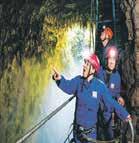
Library - Closed
Customer Service Centre - Closed. Our call centre operates 24/7. Please call 0800 932 4357 or email: info@waitomo.govt.nz
Aquatic Centre - Open 12pm - 6pm
Refuse Collection - Kerbside collection for Piopio, Awakino and Mōkau will take place on Monday as normal
All Waste Transfer Stations are closed
Waitomo District LandfillOur Landfill is closed on Monday as normal
Waitomo District Council Staff wish you all a happy and safe holiday weekend!
Situations Vacant
Position: Reception/ Office Administration
Contract: Permanent Full Time
Location: King Country Vets, Piopio


• Be part of a professional and enthusiastic mixed veterinary practice.
THE ROLE:
To be successful in this role you will need to demonstrate:
• Excellent computer skills, stock control experience, geographical knowledge of Piopio, Te Kuiti and surrounding areas and a flair for organising people (running our farm vet diary is a key task).
• A passion for customer service, an eye for detail, efficient time management and excellent communication skills.
• Previous farming or veterinary clinic experience will be an advantage.
ABOUT US:
We are a small, cohesive and service driven team who work hard but have fun at the same time. The practice is owned independently by four employees, and we have an excellent culture.
The job will be normal hours, Monday to Friday with no weekend work. Don’t miss this opportunity to join our team!
If you think you have what it takes please email a cover letter and your up to date CV to Lisa Coles, Clinic Coordinator, lisa@piopiovets.co.nz by 25th October 2024
The agenda for this meeting has been sent to all Shareholders whoseaddresses are known.
For further information or if you have any pātai, please feel free to contact the Secretary.
Secretary’s Office: Deloitte, Pukeroa Oruawhata House, 2/1176 Amohau St, Rotorua PO Box 12003, Rotorua
Ph: (07) 343 1050 Email: nzrotoruaenquiries@deloitte.co.nz Wayne Brewer Chairperson
Public Notices
We are inviting rural school teams and sporting groups to apply for financial assistance through the Sport New Zealand Rural Travel Fund. The fund is designed to help subsidise rural travel for junior teams aged between 5-18 years. It helps school and club sports teams participate in local sporting competitions. Please note: The Rural Travel Fund is not for the purpose of travel to regional or national events or available for individual athletes or players.
The online application form and further details outlining the fund are available on our website www.waitomo.govt.nz or by contacting the Customer Services Team on 0800 932 4357.
Applications close at 5pm on Friday 8 November 2024.




Te Kūiti......................................................07 878 1450
Ōtorohanga..............................................07 873 7399
Piopio.......................................................07 877 0490
Benneydale..............................................07 878 1370
Ōtorohanga..............................................07 873 8399
Te Kūiti......................................................07 878 7878
For all urgent out of hours call.................07 878 7878
Unichem Te Kūiti Pharmacy Sat 9.30am - 12.30pm..............................07 878 8011
Unichem Ōtorohanga Pharmacy Sat 9am - 12.30pm..................................07 873 7294
Citizens Advice Bureau -Ōtorohanga, Te Kūiti and Taumarunui (free legal advice)...............................0800 367 222/07 878 7636
Community Mental Health Service..........07 878 8767
Emergencies..........................................0800 505 050
Counselling Services North King Country Mon - Fri, 9am - 3pm................................07 873 7676
Waitomo Women’s Refuge Helpline........07 878 5081
...........................................................or 0800 733 843
Te Kūiti Hospital.......................................07 878 7333
Cancer Society supportive care nurse...0800 227 744
Te Kūiti Community House ......................07 878 5272
NKC Family Support Mon - Fri, 9am - 3pm...............................07 873 6502
Noise Control (Waitomo District Council) .................................................................07 878 0800
Noise Control (Ōtorohanga District Council) .................................................................07 878 4000
Ōtorohanga District Council (24 hrs).......07 873 4000
Waitomo District Council (24hrs).........0800 932 4357
Victim Support Services.......................027 281 1499 ...........................................................or 0800 842 846



873
BENNETT, Robert Dennis: On Friday, October 11, 2024 passed peacefully after a brief illness in his 83rd year. Dearly beloved husband of Jennifer (Jenny) for 60 years. Dearly loved Father and Father-in-law of Julie and John Clark, Grant and the late Jane. Loved Pop of Kirsty, Matthew and Amy, Lauren and Blake, and William Grand Pop of Olive In accordance with Robert’s wishes a private Family Service has been held. All communications to the Bennett family, PO Box 137, Te Awamutu 3840. Te Awamutu Funeral Services, FDANZ.
Sunday Service 10.30am Kids Club 11am Youth 12.30pm-3pm Evening service 7pm The Harvest Centre, 5 Tuhoro St, Otorohanga 07 873 8890 I 027 493 0117 • harvest.pc@xtra.co.nz Pastors Peter & Carole Coventry (An Assemblies of God Church)
When we pray, God hears more than we say, answers more than we ask, gives more than we imagine. (Nicky Gumbel)

1st and 3rd Sunday 2pm Service


10 Sheridan St, Te Kūiti An Assemblies of God church
10:30am Sunday 10 Sheridan St, Te Kuiti Pastor Terry & Rowena Bradley 07 878 8694 021 703 008
We welcome you to our 10.30am Sunday service. If you are unable to attend, please email officejourneynz@gmail.com for the video recording Grace, peace and strength
An Assemblies of God Church
Piopio contact: 07 877 8097 Mōkau contact: Mrs Dorothy Lowry 06 752 9123 St Bride's Anglican Church Haerehuka St Ōtorohanga SUNDAY Morning service 10am Ph 07 873 7006
POWELL, David: 21/10/2022 and BOROS-POWELL, Delena Maree: 20/10/23. In loving memory. Two years has passed David and oneyear Delena. I loved you both so much and miss you. Irene and families.




Don’t forget to include your billing details, name, address & daytime contact phone number


















